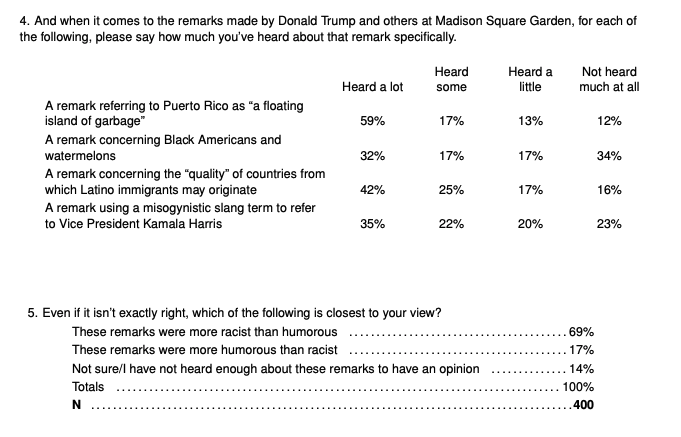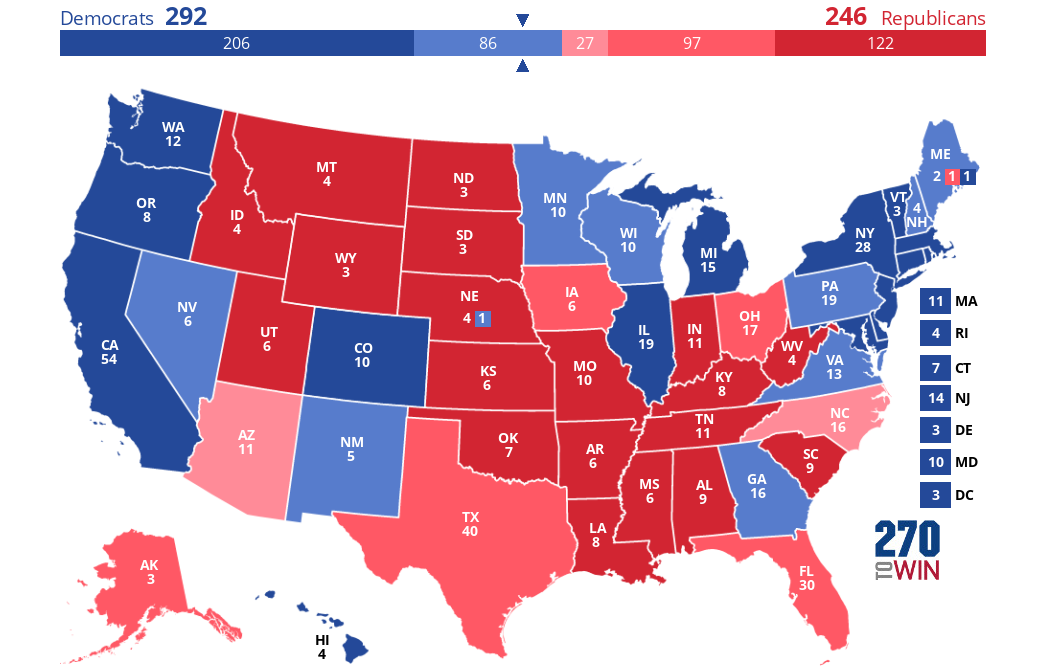POLS 1140
Gender and Sexuality
Updated Jan 29, 2026
Monday
Plan
Monday:
- Previewing the Election (~15-20 minutes)
- Gender as a social identity (10-15 minutes)
- Gender gaps in political behavior (10-15 minutes)
- Gendered political socialization (If time)
Tuesday
- VOTE!!!!
Wednesday
Early reactions to the election
Gendered political socialization (If time)
Gender, sexism and representation (Huddy and Terkildsen 1993)
Friday
Review Draft Survey Instrument
Sexual identity as political identies (Egan 2012)
Wednesday
Overview
We’re gonna talk about election:
What happened?
Why did it happen?
What have we learned…
What comes next?
What Happened?
What happened?
Trump wins the Presidency (~312-226 electoral votes)
Republicans flip the Senate (51-57 seat majority)
Control of the House still in play (probably won’t know for a while)
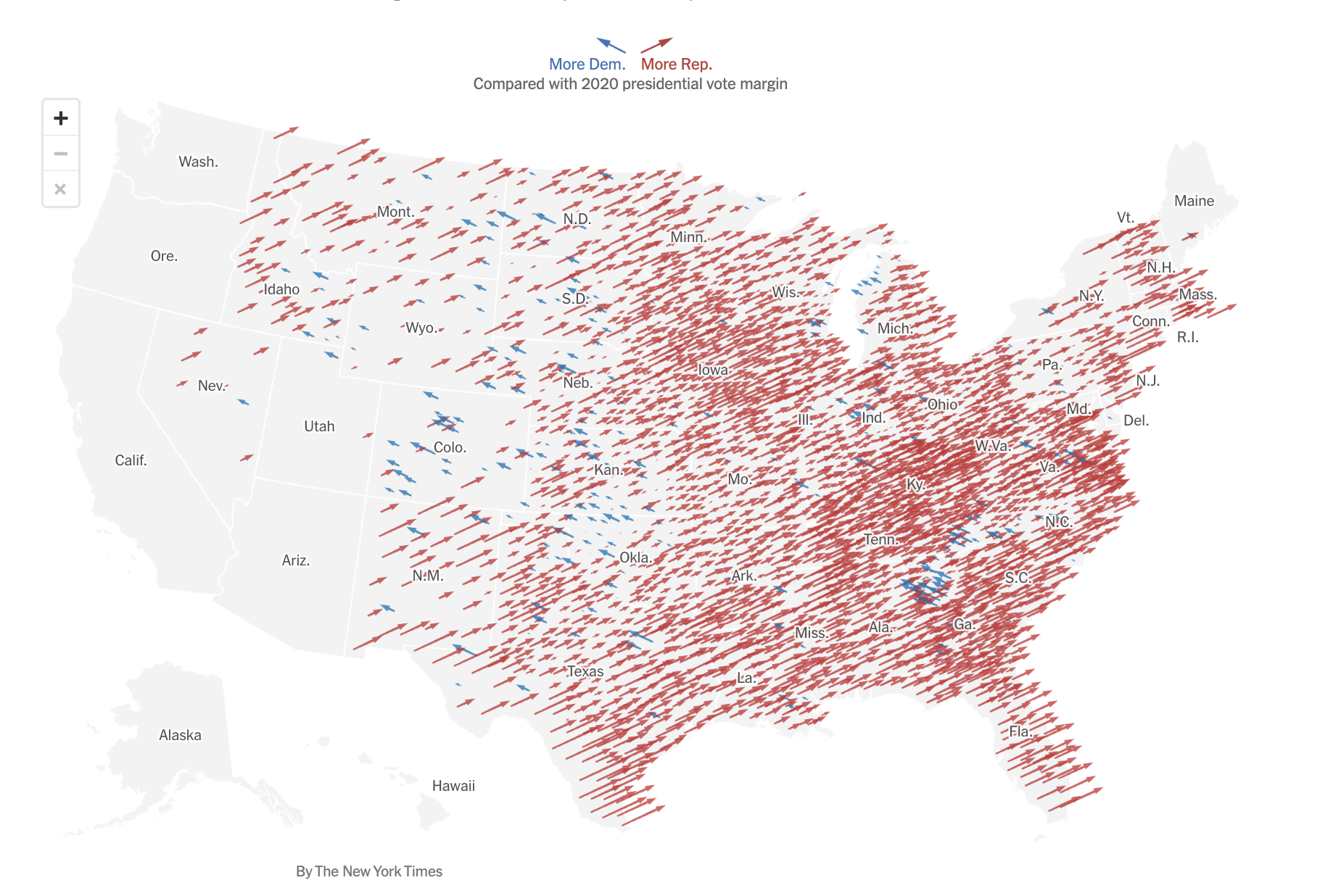
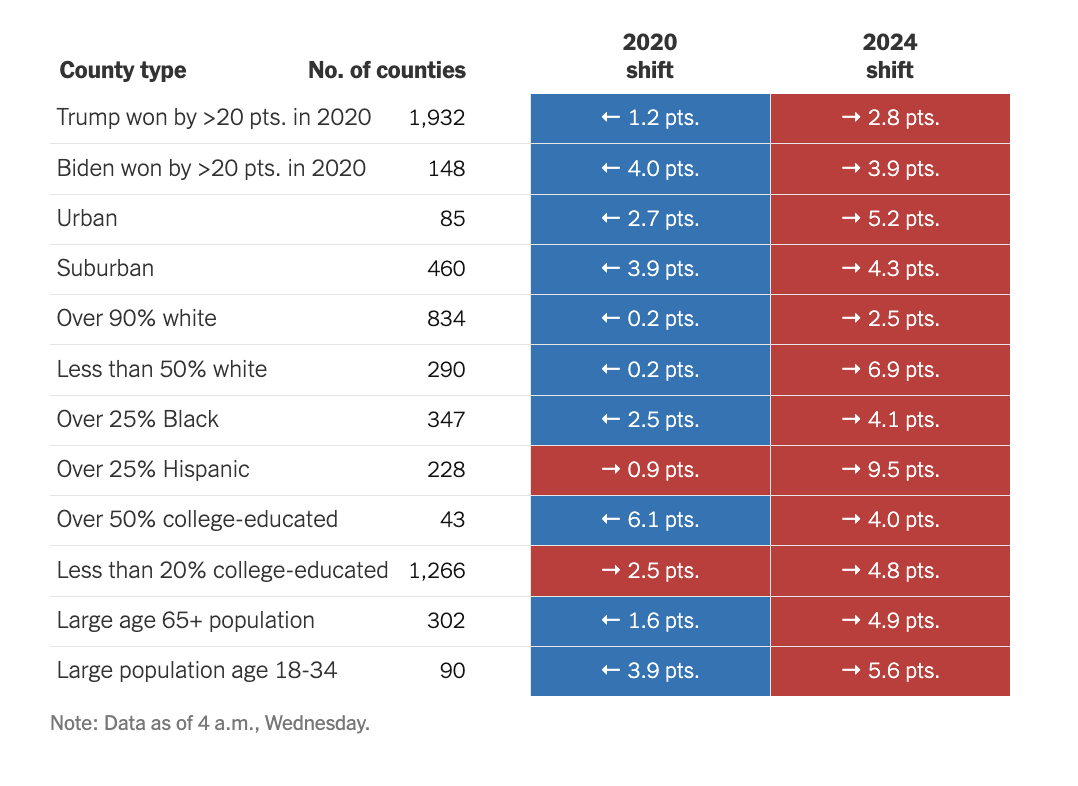
Why did it happen?
Why did it happen?
Why did Kamala/Democrats lose?
Why did Trump/Republicans win?
What’s the counterfactual?
What would have happened had:
- Biden not run for re-election
- The Republicans nominated Nikki Haley
- Had we accepted higher unemployment for lower inflation?
Types of explanations
It’s the campaigns
It’s about specific groups of voters
It’s about the issues: immigration, abortion, democracy, crime, culture war
It’s about the issue: “it’s the economy, stupid”
It’s about racism, sexism, transphobia, xenophobia
It’s about the vibes (anti- establishment/elite/incumbency )
It’s probably about all of these things, to some degree. Beware of singular explanations and broad generalizations.
Early exit polling
These are mostly from CNN’s exit polling as well as NBC and the Washington Post
The margins can and will change when weighted against the final results
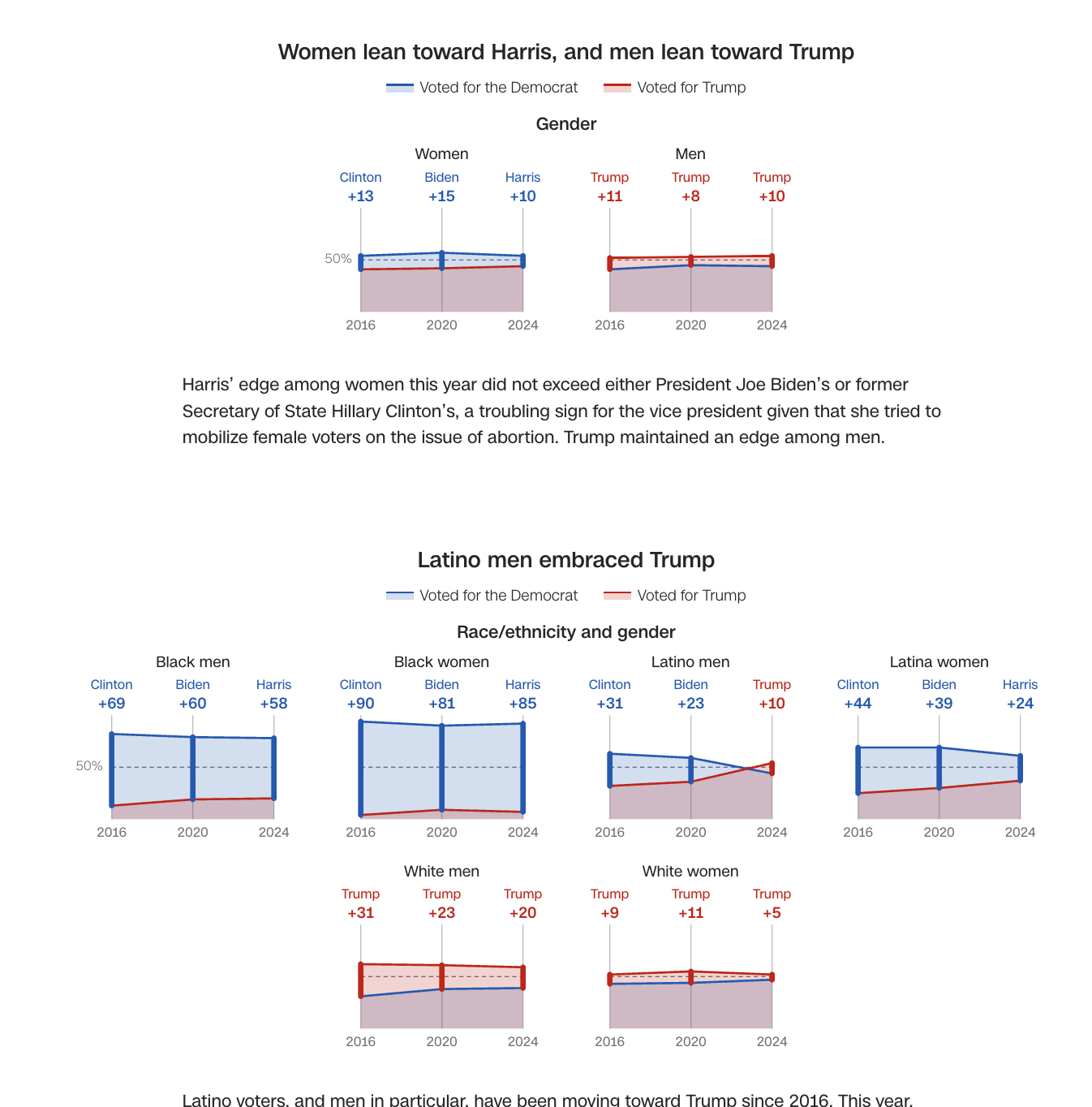

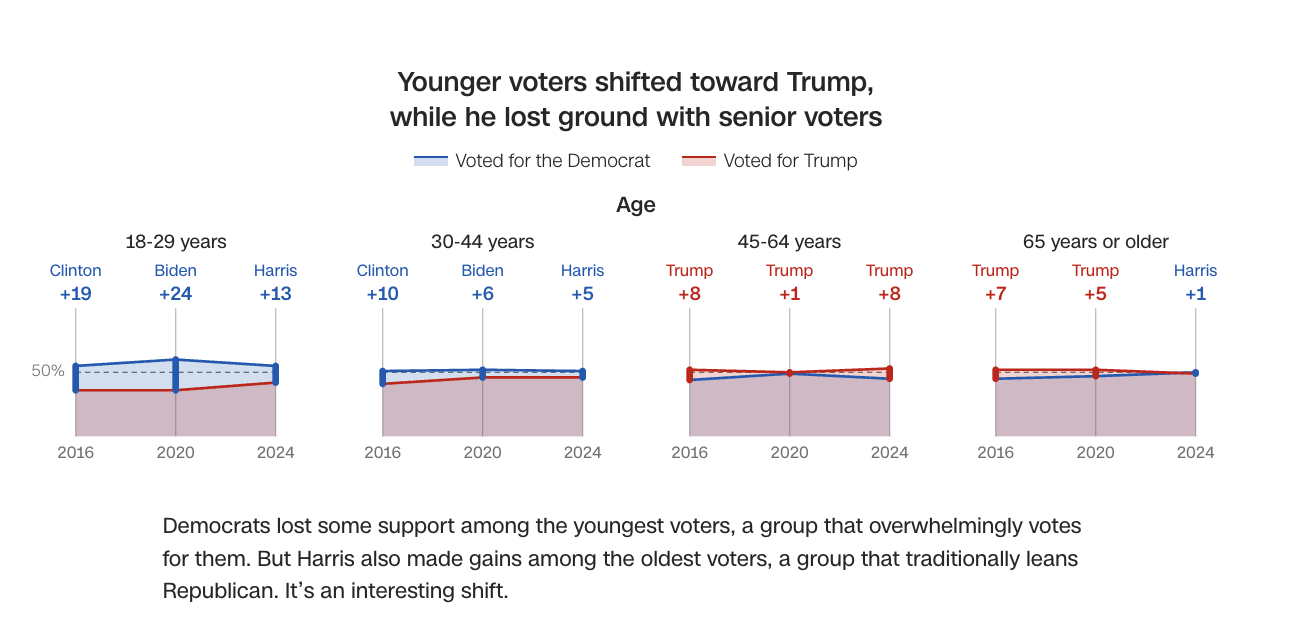
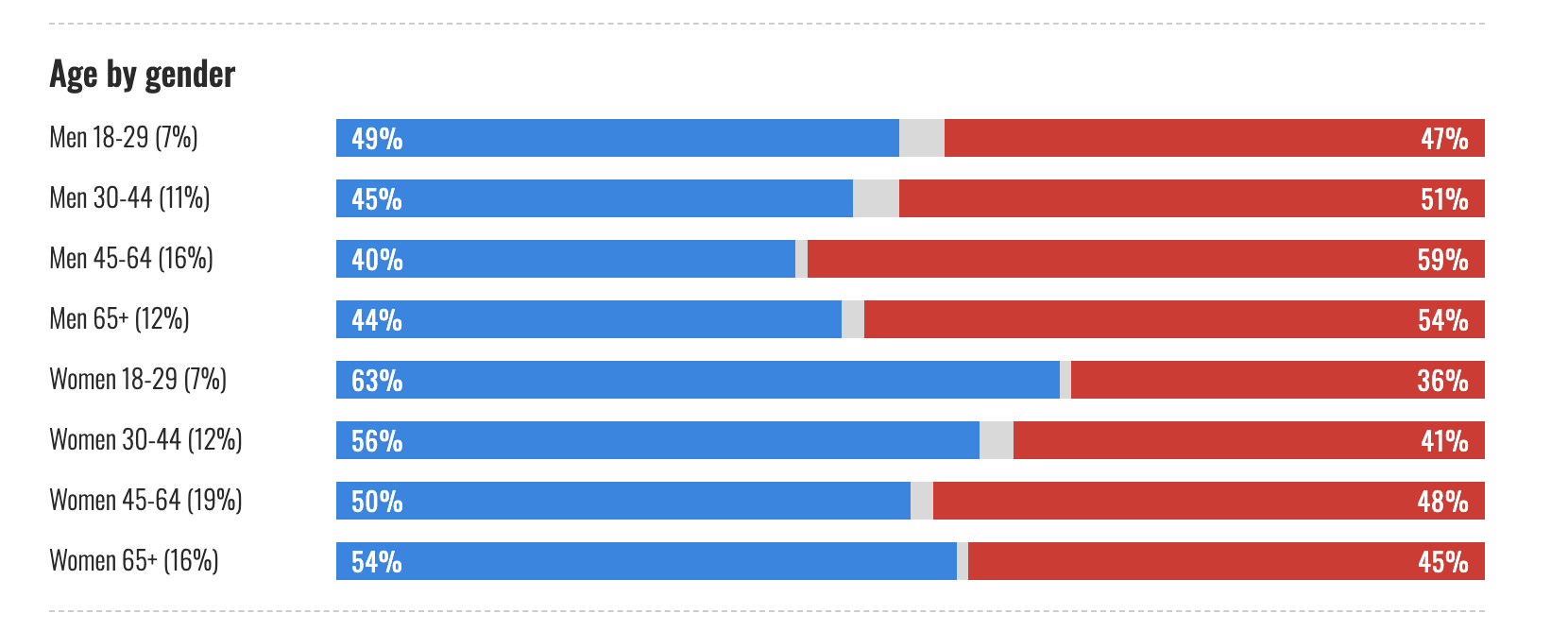
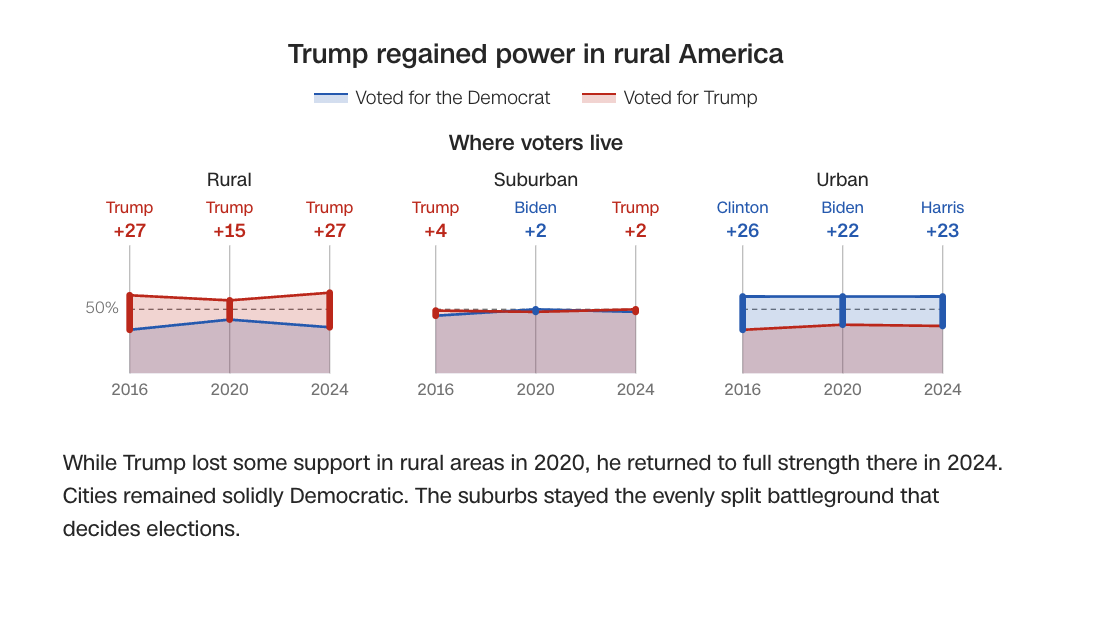
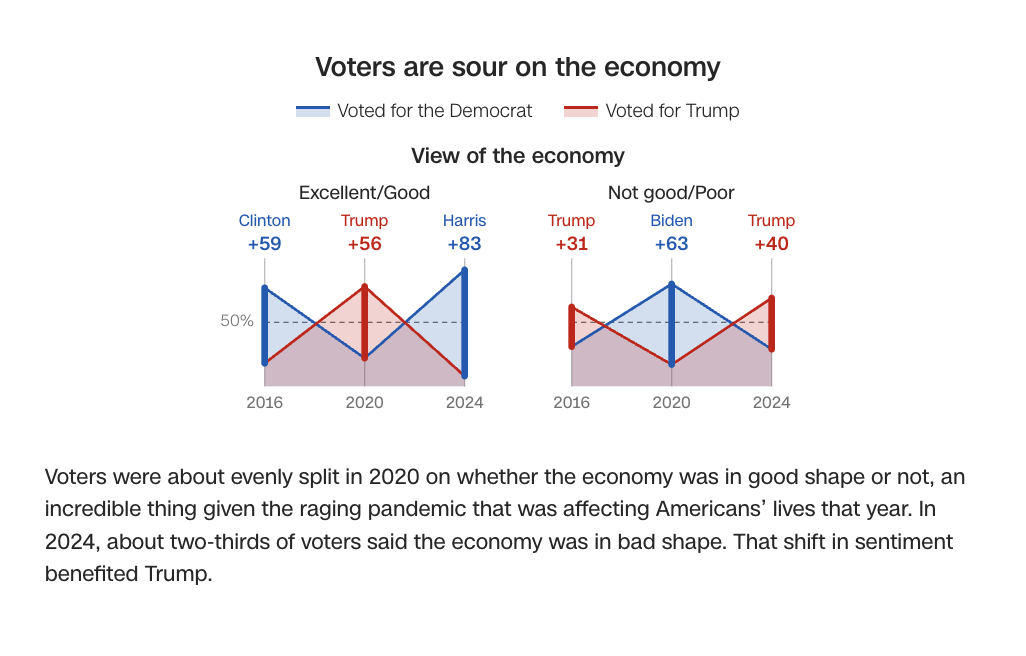
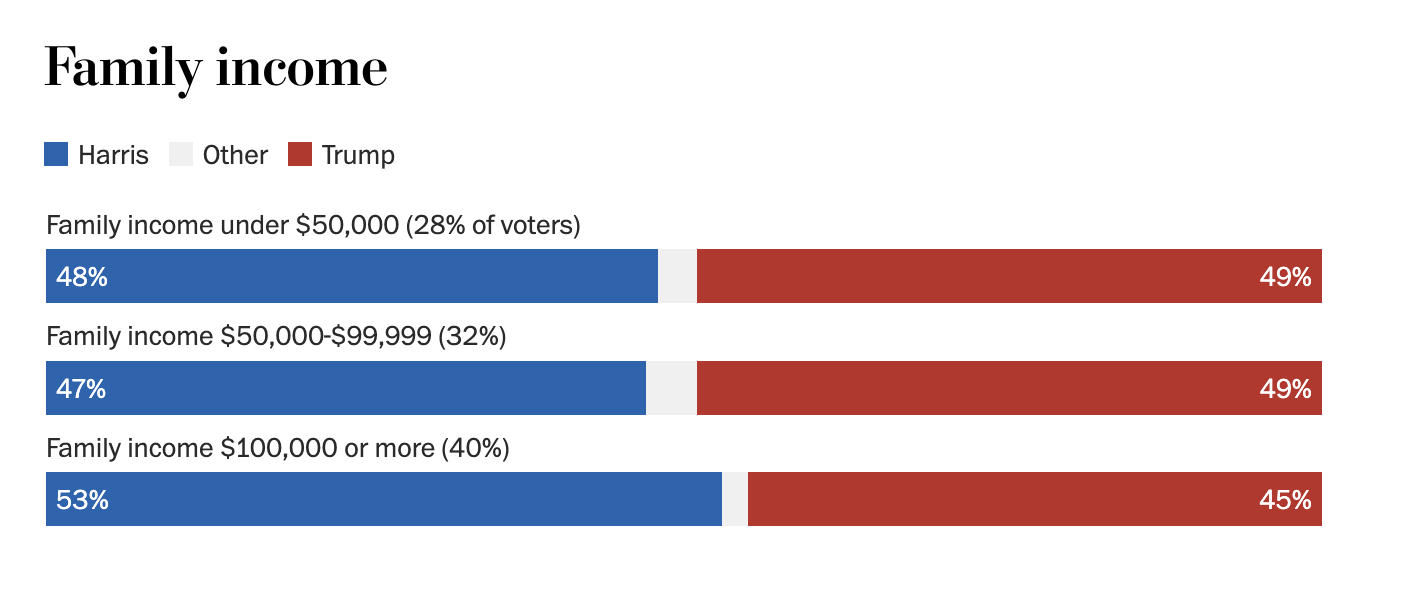
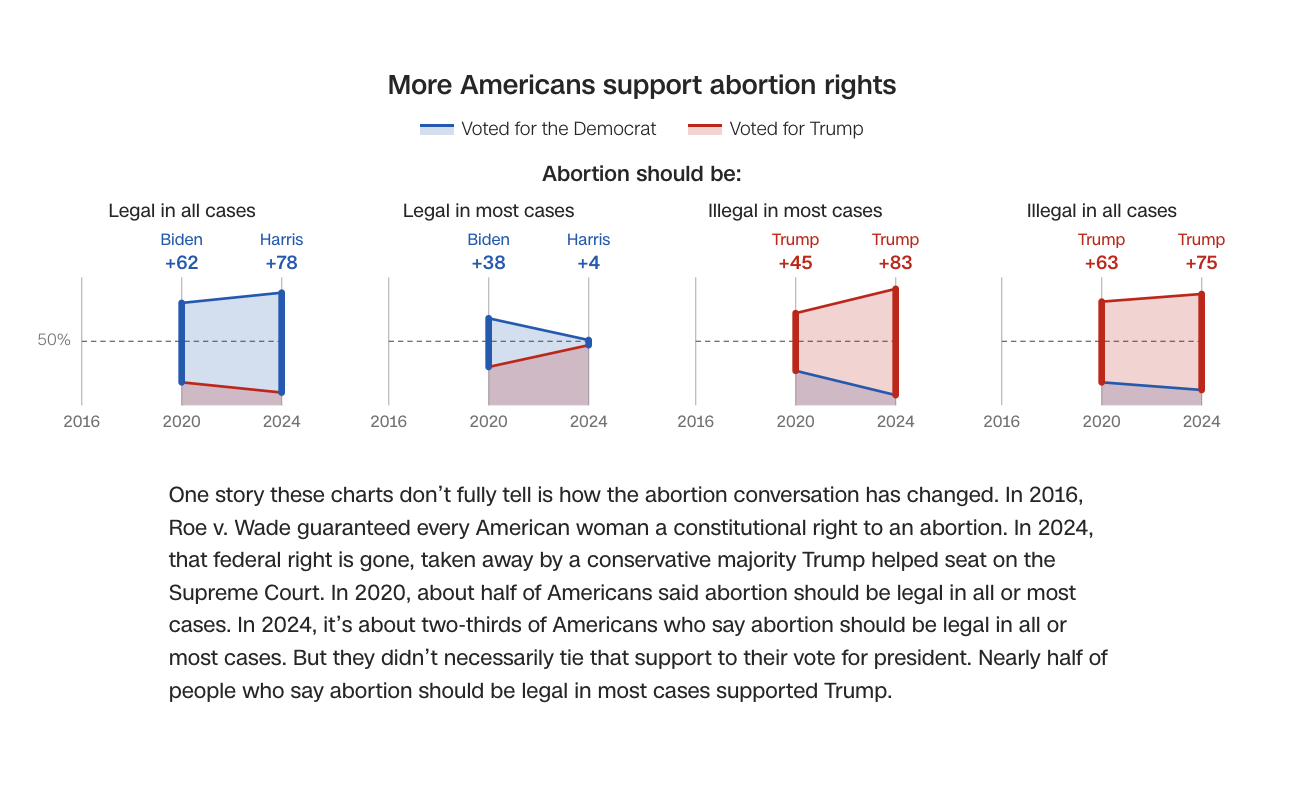
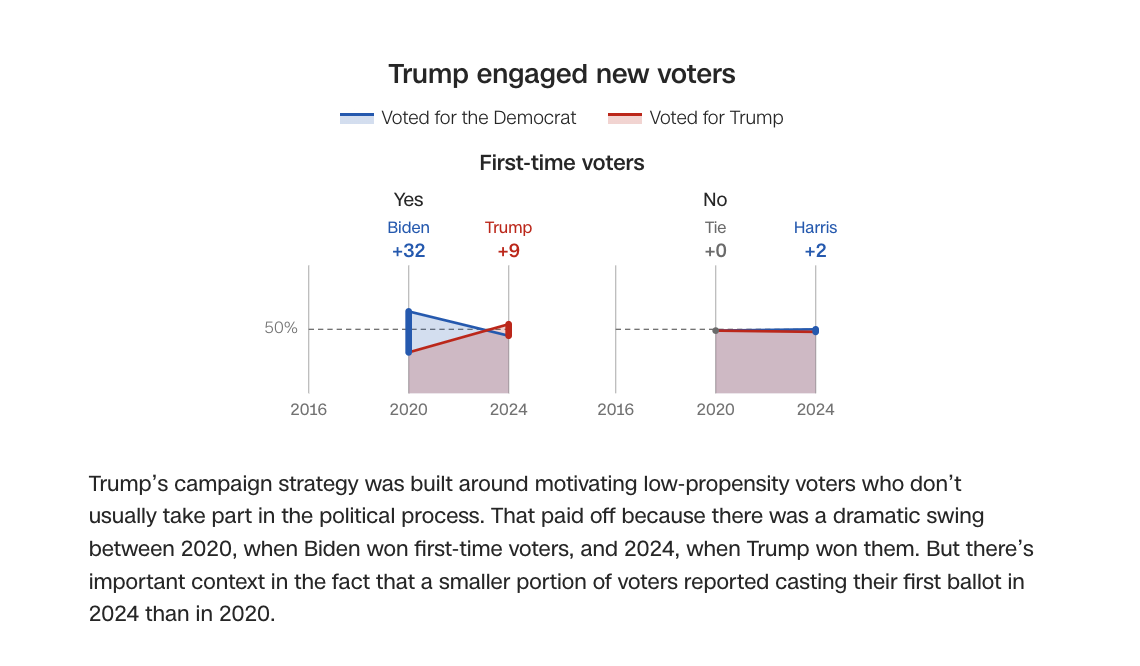
What have we learned…
…About the polls
Are the polls fundamental broken?
Yes Missed the strength and depth of Trump;s support in three elections
No: Wait for the final counts. The absolute polling error likely within historical margins
Yes: The forecasts were off in all the battleground states
No: Forecasts showed a 50-50 race in which a Trump sweep was the most likely (of many) possible battleground outcomes
Yes: Polls like the Selzer/Iowa poll missed bigly
No: But polls that took a more aggressive weighting approach were more accurate
Yes: It’s unclear that their strategies were anything but luck/fear of getting it wrong (e.g. weighting on past vote tended to increase support of Harris )
No: Still the polls picked up evidence of racial depolarization, education polarization, shifts in PID that shaped the election….
Can we trust the polls?
Polling is hard.
Polling with Trump on the ticket is particularly hard
My answer is always relative to what?
- Pundits vibes/conventional wisdom? Yes
- Prediction markets? Honestly, still probably yes.
Polls are useful even when they’re wrong
What comes next?
What comes next?
A lot depends on the House
Congress has several biases toward the status quo and inaction (super-majoritarian Filibuster)
- National abortion ban, 20% tariffs seem unlikely. But so did Trump’s second term…
More worried about the Executive Branch
- Less oversight, fewer guardrails, more particular harms (immigration, judicial appointments, civil service, foreign policy)
How much does Trump care about governing?
- How much does Trump care about score settling
What comes next?
A lot depends on you
Politics is about power
To wield power you need to win elections
Winning elections requires coalitions
Building coalitions requires compromise
It’s a lot of work, that often happens at a more local level
But it’s worth it. And it’s more important than ever.
Friday
Plan
Let’s do some combination of the following:
More discussion of the election
Broad overview of gender and politics literature (pick up in more detail next week)
Attendance Survey!
Click here to be rewarded for your attendance on a beautiful Wednesday afternoon
POLS 1140 and the Election
Take a few moments and think about the election from some of the perspectives we’ve talked about this semester.
What
Ideology and issues
Political knowledge and misinformation
Retrospective and economic voting
Social identities
- Partisanship
- Race
- Gender
Have our answers about citizen competence changed?
2024 Election
Overview
What the polls (and forecasts) are saying?
So can we trust the polls? (Nate Cohn Op-ed)
Mobilization and Persuasion
Predictions
What to watch for on election night
What the polls are saying
Final batch of polls continues to show a toss-up, with a range of results that are good, mixed, or bad for each candidate
Harris +3 in Selzer/DMR Poll in
Harris +35% among Latinos in Univision/YouGov
NYT/Sienna (+Harris: NV, NC, WI, GA; Tie: PA, MI; +Trump: AZ)
Morning Consult (+Harris: MI; Tie: PA, AZ +Trump: GA, NC, WI )
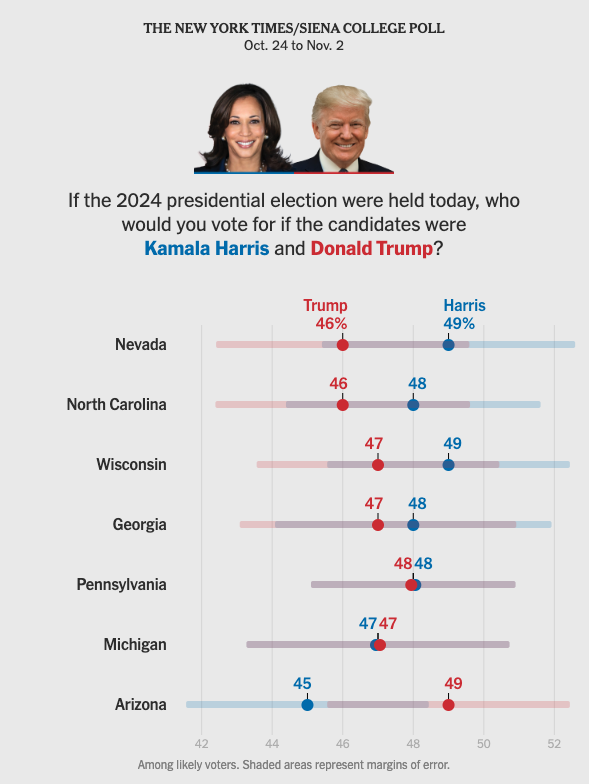

So can we trust the polls
Let’s take a few minutes to discuss Nate Cohn’s article
What’s the case for optimism
What’s the case for pessimism
What do we think
Polling was hard during the pandemic
- Differential response rates among Dems vs Reps
Pollsters adapt
- Weighting on past vote
Polling elections with Trump is hard
- Unlikely voters = unlikely survey respondents
Weighting on past vote is no panacea
- Recall is imperfect
Are we over- or under-compensating
The polls will be off
Systematic polling errors in either direction seem plausible
- At both the national or regional level
Why bother? What’s the alternative
- Polls and forecasts give us criteria to assess performance and explantions
Mobilation and Peruasion
Campaigns require both mobilization and persuasion
Strong evidence that GOTV campaigns (doorknocking, mail, phone) have small but real effects A. S. Gerber, Green, and Larimer (2008)
Evidence for persuasion is more mixed for both canvassing (Kalla2018-jf?) and ads (A. S. Gerber et al. 2011)
The campaigns have very different “ground games”:
- Harris more traditional GOTV
- Trump focused on contacting and mobilizing unlikely voters and outsourcing GOTV to Elon.
And very different advertising strategies
My prediction
The best available data tell us this race is a toss-up
Let’s walk through what I think are the case for each candidate
Slightly ahead in most forecasts
Historical strength and focus on unlikely voters
- Hard to poll, hard to know
Unconventional ground game
After stalling in the polls, seems to be trending in the right direction
- Late breaking voters appear to be swinging breaking her way
Asymmetric costs of polling errors
- Pollsters more worried about underestimating Trump a third time
General vibes?
- Iowa poll, rally size, various annectdata
What to watch for when
When Harris campaign expects to see results in key states. Per email I just got pic.twitter.com/dFdBc2DKtD
— Ayden (@AydenMakesMaps) November 3, 2024
Gender and Politics
Gender in the 2024 Campaign
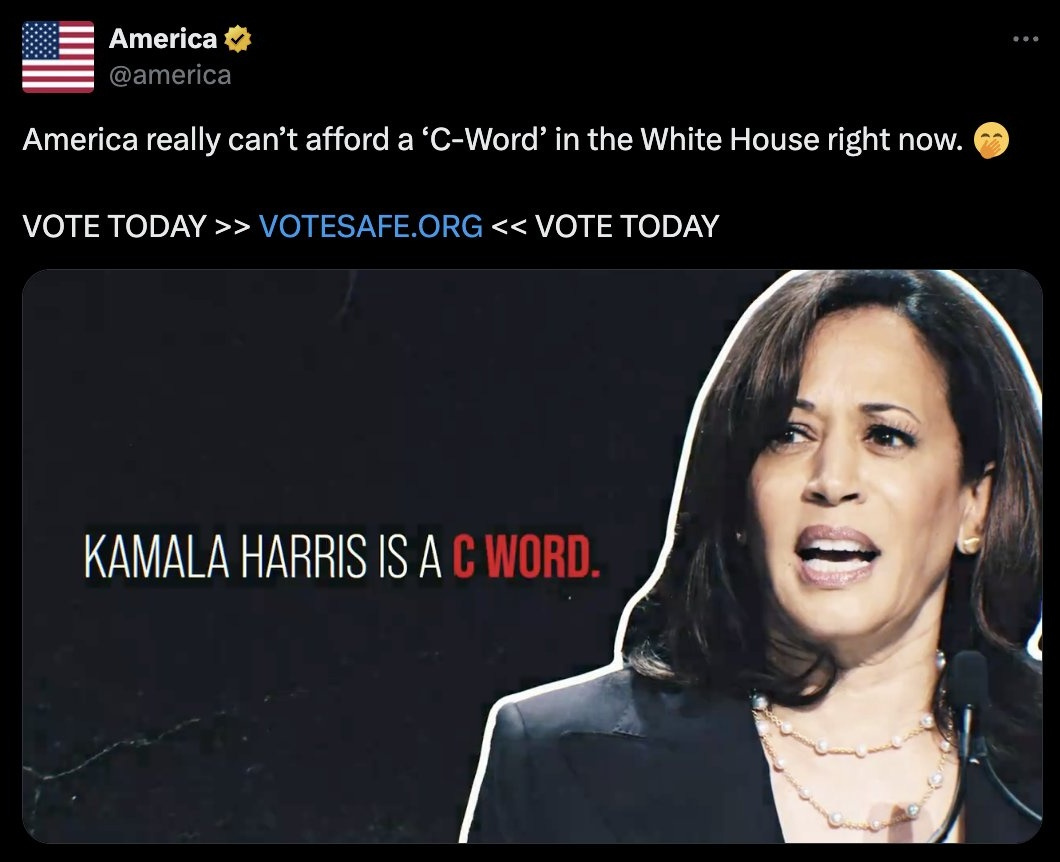


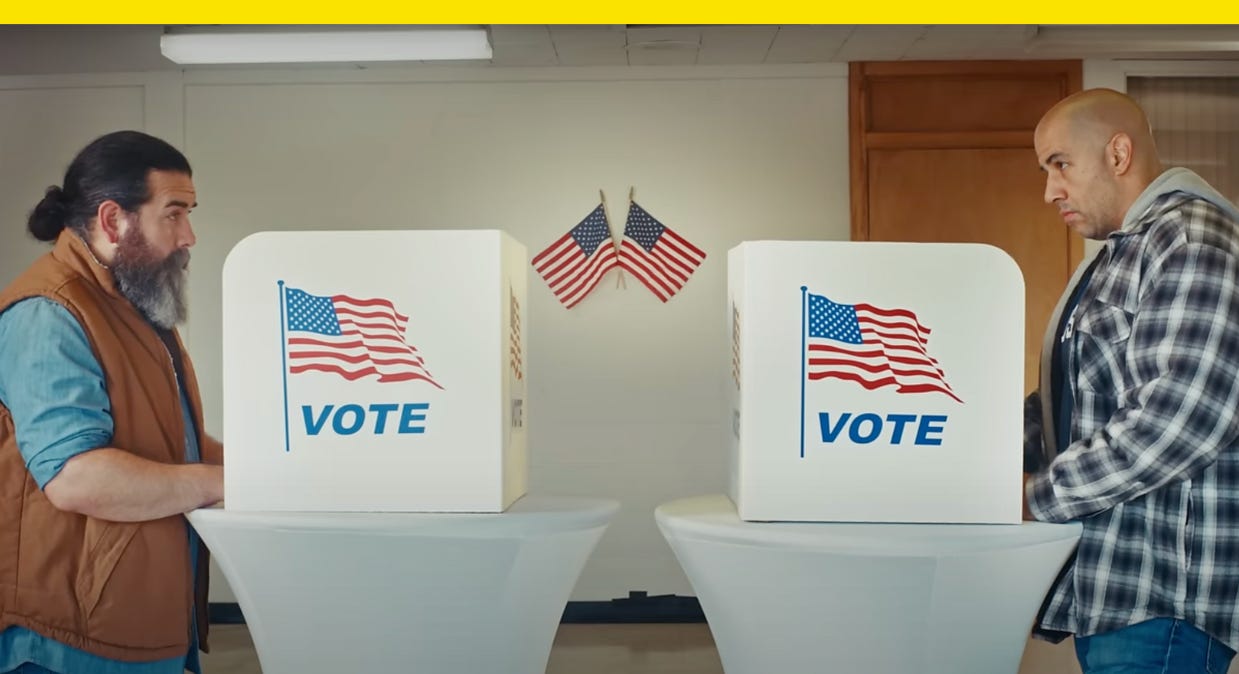
Why gender and and politics matter
- Like race and partisanship, questions of gender pervaded modern politics?
- Will Kamala’s gender help/hurt her among various electoral blocs
- How will the Dobbs decision shape turnout, vote choice, and policy
- What other questions do we have
- Our goal this week, is to explore how political scientists have studied questions of sex, gender, and sexuality
Questions
What’s the difference between Sex and Gender
How does gender predict politics?
How is gender politically socialized?
How does gender and attitudes about gender shape political behavior
How does sexual identity shape political behavior?
Gender as a Social Identity
Changing Views of Sex and Gender
Sex = Gender
Binary, fixed, biologically determined
Sex as a proxy for gender
Changing Views of Sex and Gender
Sex ≠ Gender
Sex and Gender are related but distinct concepts
Gender: “what society makes of sex”
Gender Identity: “a personal sense of ones own gender”
Although differences in gender may be heritable (Hatemi et al. 2011)
Changing Views of Sex and Gender
Viewing gender as a social construct leads us to think about gender in terms of:
- Categorization
- Identification
- Consciousness
Categorization
Some features of gender are a function of biology
But sex (and gender) are not as binary or fixed as they are studied empirical models
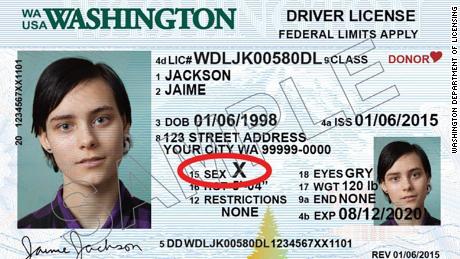
Identification
Gender as a social identity leads us to issues of
Measurement:
- Binary dichotomy, continuous scale, multidimensional
And theory:
- Variations in the strength of identification across individuals, times, and contexts
Measuring Gender
Take a few moments and write down how you would go about measuring gender?
Measuring Gender
Fixed response? How many responses?
Open response? How would you code it?
Continuous scale? What are the end points?
Multiple scales? How many dimensions?
Interviewer Assessments
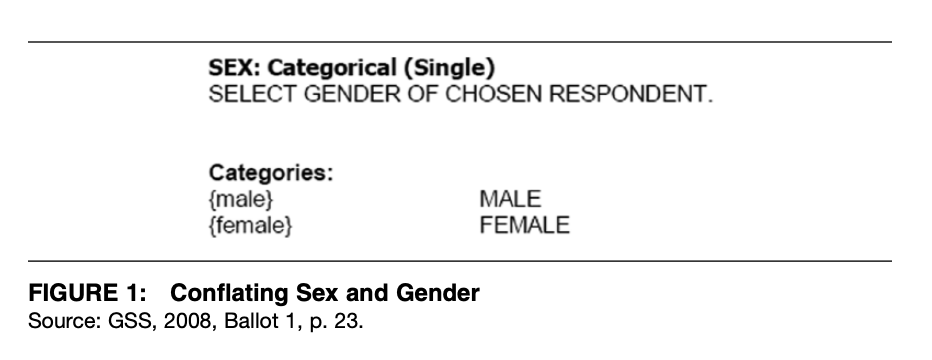
Source: Westbrook and Saperstein (2015)
(Binary) Self-Identifications

Source: Westbrook and Saperstein (2015)
A continuous measure of gender (Bittner and Goodyear-Grant (2017))
Bittner and Goodyear-Grant (2017) argue gender and sex are poorly measured in standard survey research, and propose and alternative measurement approach, concluding:
Sex is a fair proxy for gender, but for about a quarter of our sample, it is not
Gender Scales
- Where would you place yourself on this continuum? (0–100, where 0 represents those who are 100% masculine and 100 represents those who are 100% feminine)

Source: Bittner and Goodyear-Grant (2017)
Categories from Bittner and Goodyear-Grant (2017)

Source: Bittner and Goodyear-Grant (2017)
Bem (1974) Sex Role Inventory
Bem (1974) Sex Role Inventory
Group Consciousness
How might we measure “gender group” consciousness?
Stout, Kretschmer, and Ruppanner (2017) propose a concept of gender linked fate:
Stout et al. (2017)
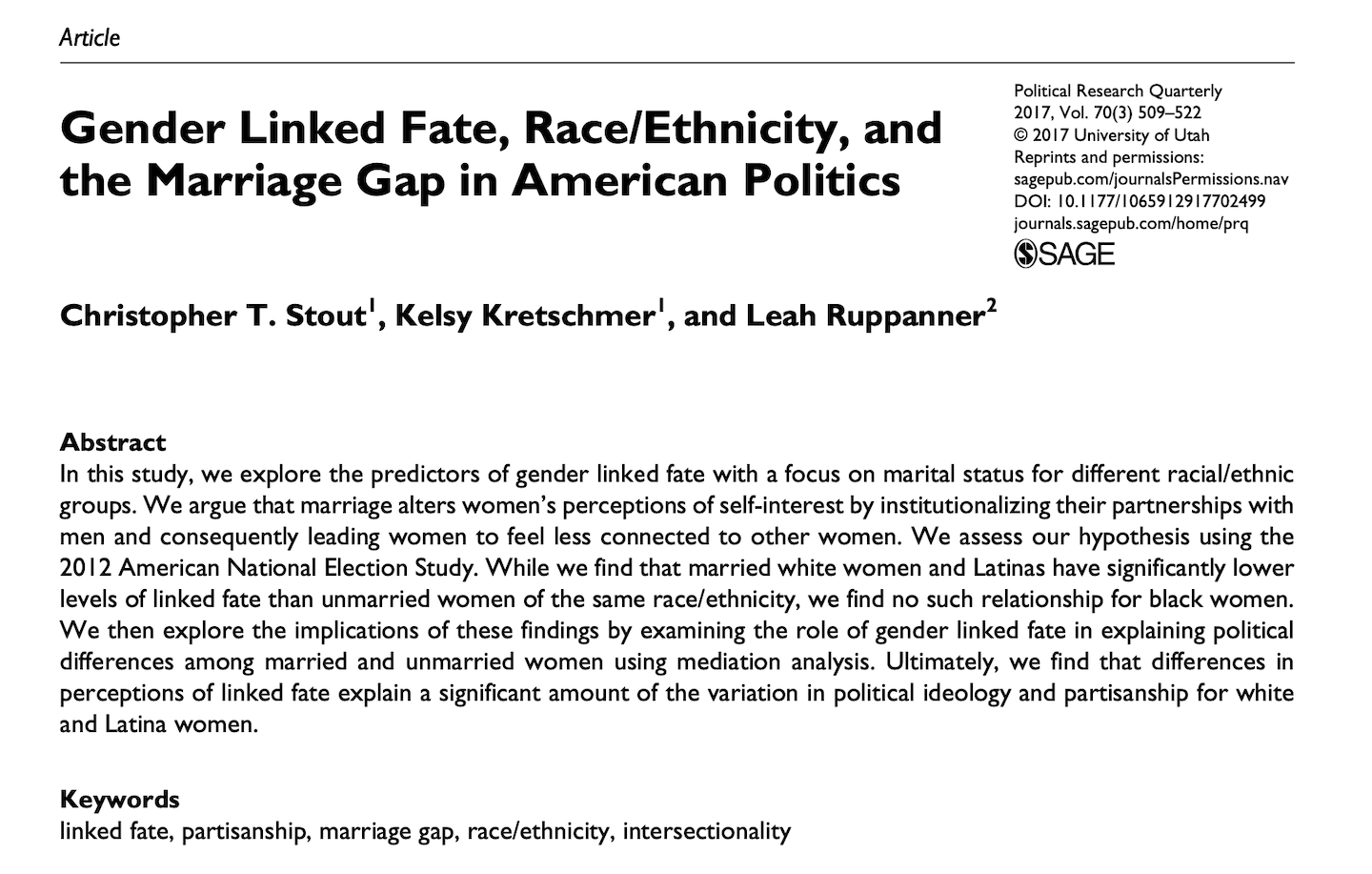
Stout et al. (2017)
Adapt Linked Fate approach and Ask male/female respondents, respectively:
- “Do you think that what happens generally to men/women in this country will have something to do with what happens in your life? How much does what happens to others affect you?
Married Women Show Lower Levels of Gender Linked Fate (GLF)

Variations in GLF mediate differences in partisanship and ideology

- For white and latina women. Not huge differences…
Group Discussions
- We’ve discussed both race and gender as politically relevant social identities
- How are they similar?
- How are they different?
Comparing Racial and Gender Identities
Burns and Kinders (2011) of discussion of the similarities and differences between racial and gender identities:
Similarities
- Socially constructed
- Mental categories (powerful cues/heuristics?)
- Sites of durable inequality
Key difference
- Gender → intimacy between groups
- Race → separation between groups
- Consequences for:
- “Gaps” literature
- Group consciousness?
Summary
- Gender and sex are related but distinct
- Gender like race is socially constructed
- Both nature and nurture matter
- Social identity theory helps us understand the similarities and differences between gender and other social identities
Gender Gaps
Gender Gaps
As with race, research document’s gaps between men and women in
Partisan Identification (Women → + Democratic)
Political Participation (Women → - Participation)
Political Knowledge (Women → - Political Knowledge)
Political Attitudes (Women → + Liberal Attitudes)
Gender Gaps (GG)
As with race
Analysis can be overly simplistic
Satisfying explanations are often lacking
Unlike race
- More variation in gaps over times
GG in Partisan Identification is Persistent

GG in Partisan Identification is Relatively Small
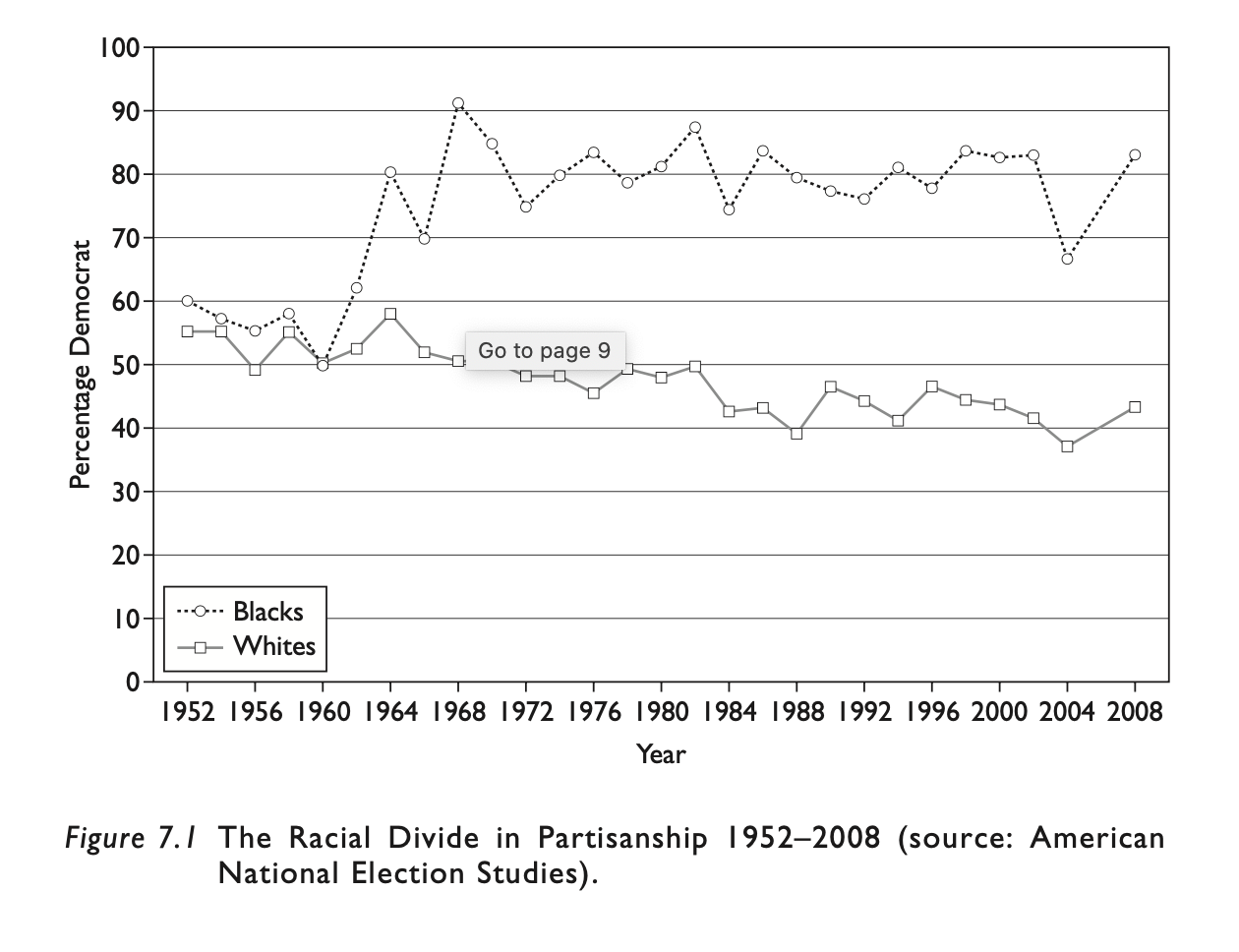
GG in Vote Choice is Larger

GG may obscure racial gaps

GG may obscure racial gaps
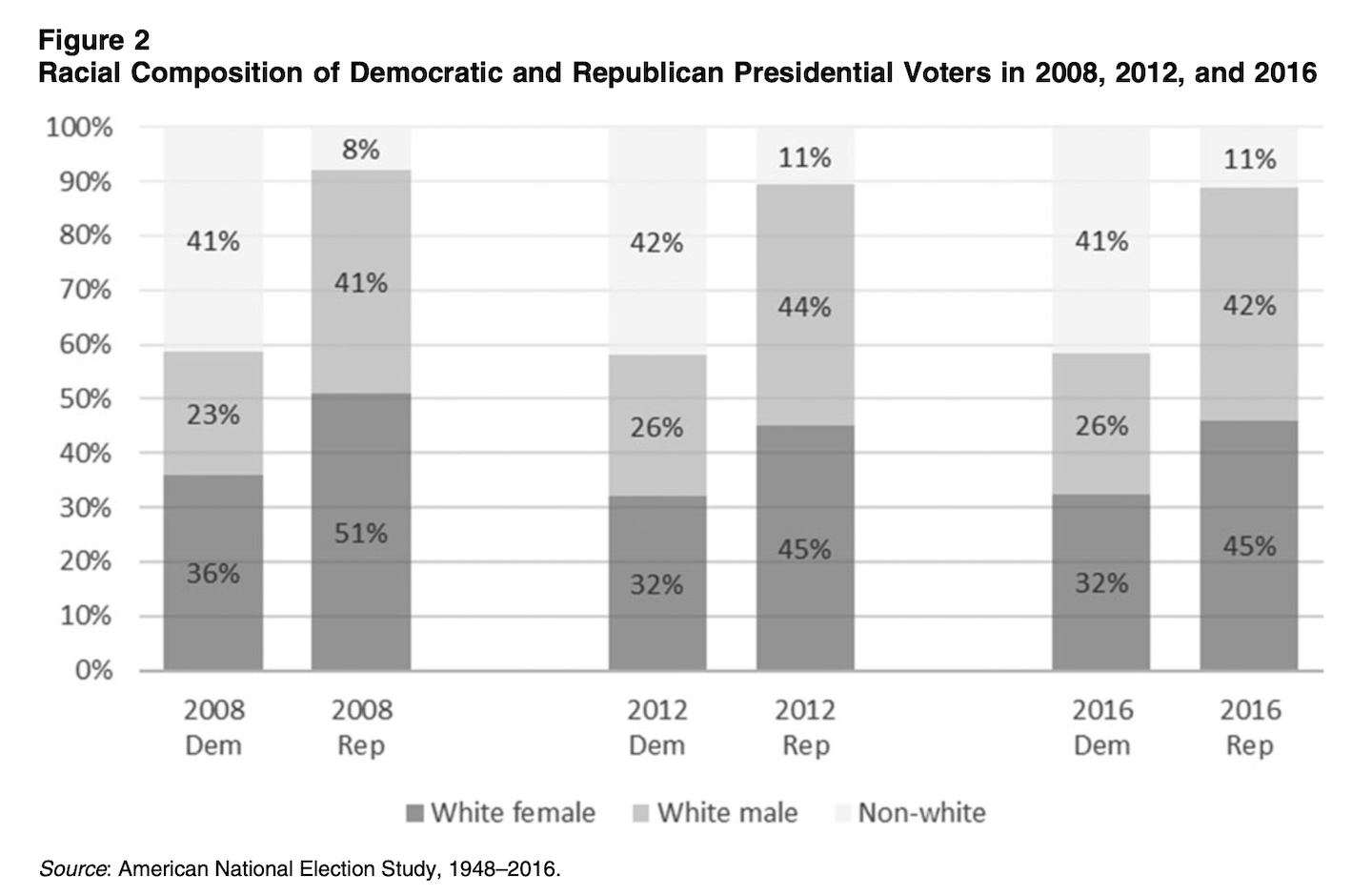
GG in political participation have declined over time

Source: Burns et al. 2018
GG in political knowledge
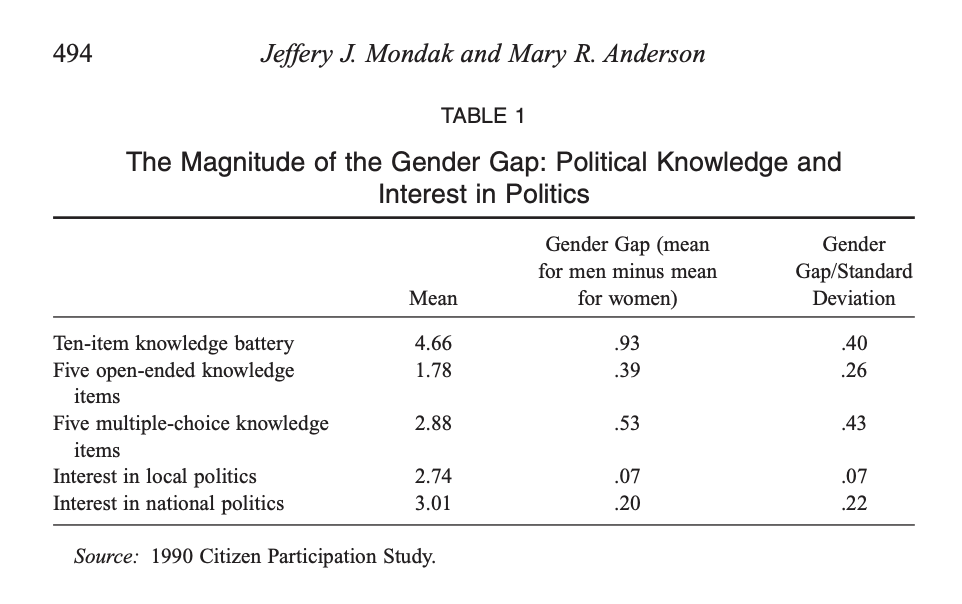
Source: Mondak and Anderson 2004
GG in political knowledge may reflect differential rates of guessing
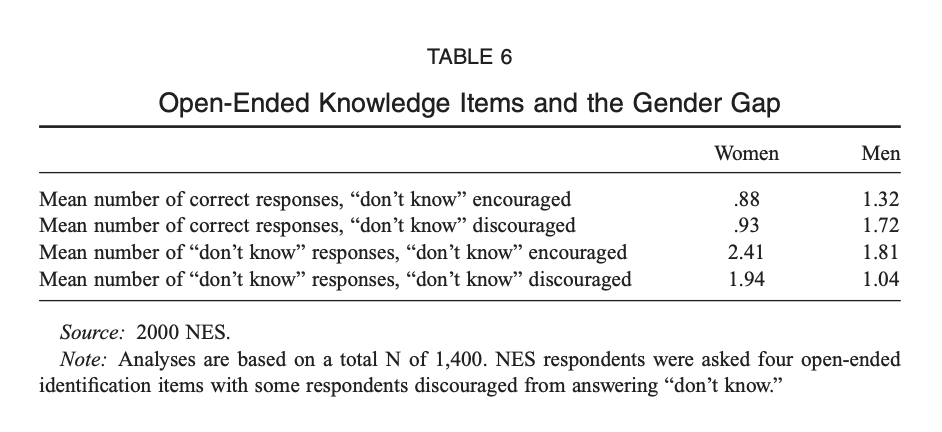
Source: Mondak and Anderson 2004
GG in political knowledge may reflect different dispositions and socialization
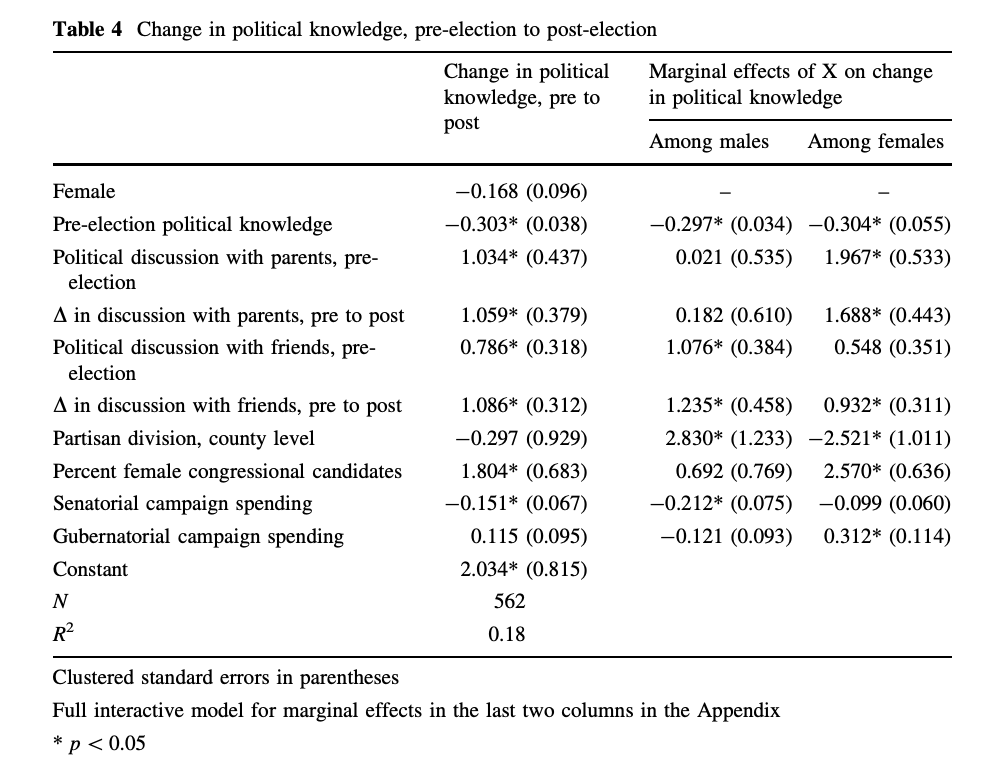
Source: Wolak and McDevitt 2011
GG in Political Preferences

GG in Political Preferences may obscure variations by gender identification

Gendered Political Socialization
Gendered Political Socialization:
What explains longstanding gaps in levels of political interest, knowledge and participation between men and women?
Gendered Political Socialization contends that the intersection of gender and political socialization:
shape children’s perceptions such that politics is a masculine domain and political leaders are more likely to be men and (2) result in girls perceiving a mismatch between their gendered expectations and with exploring politics or pursuing political roles (p. 486)
GPS draws on:
Theories of socialization: A broad field of research which argues early childhood experiences and environments have lasting social and political effects.
Social role theory suggests “children mimic the gendered division of labor that they observe in the home and that this behavior reinforces (and perpetuates) gender roles, traits, and motivations”
Key Expectations
Gendered Socialization:
H1: Gendered occupational preferences
H2: Gendered occupational preferences strengthen with age
Political Socialization:
- H3: Greater political interest and content with age
Gendered Political Socialization
H4: Childrens’ images of political leaders more likely to be male
H5: Images of female political leaders less likely with age
H6: Girls report lower levels of political interest and ambition than boys
What’s the empirical design
Interviews and surveys of 1,604 children from 18 schools in Boston, upstate NY, NE Ohio, and New Orleans from grades 1-6.
Key outcomes:
- Draw a Political Leader (DAPL)
- Exposure to Political Activities
- Political Interst
- Political Ambition/Gendered Occupations
Methodology:
- Descriptive statistics
- Multilevel regression
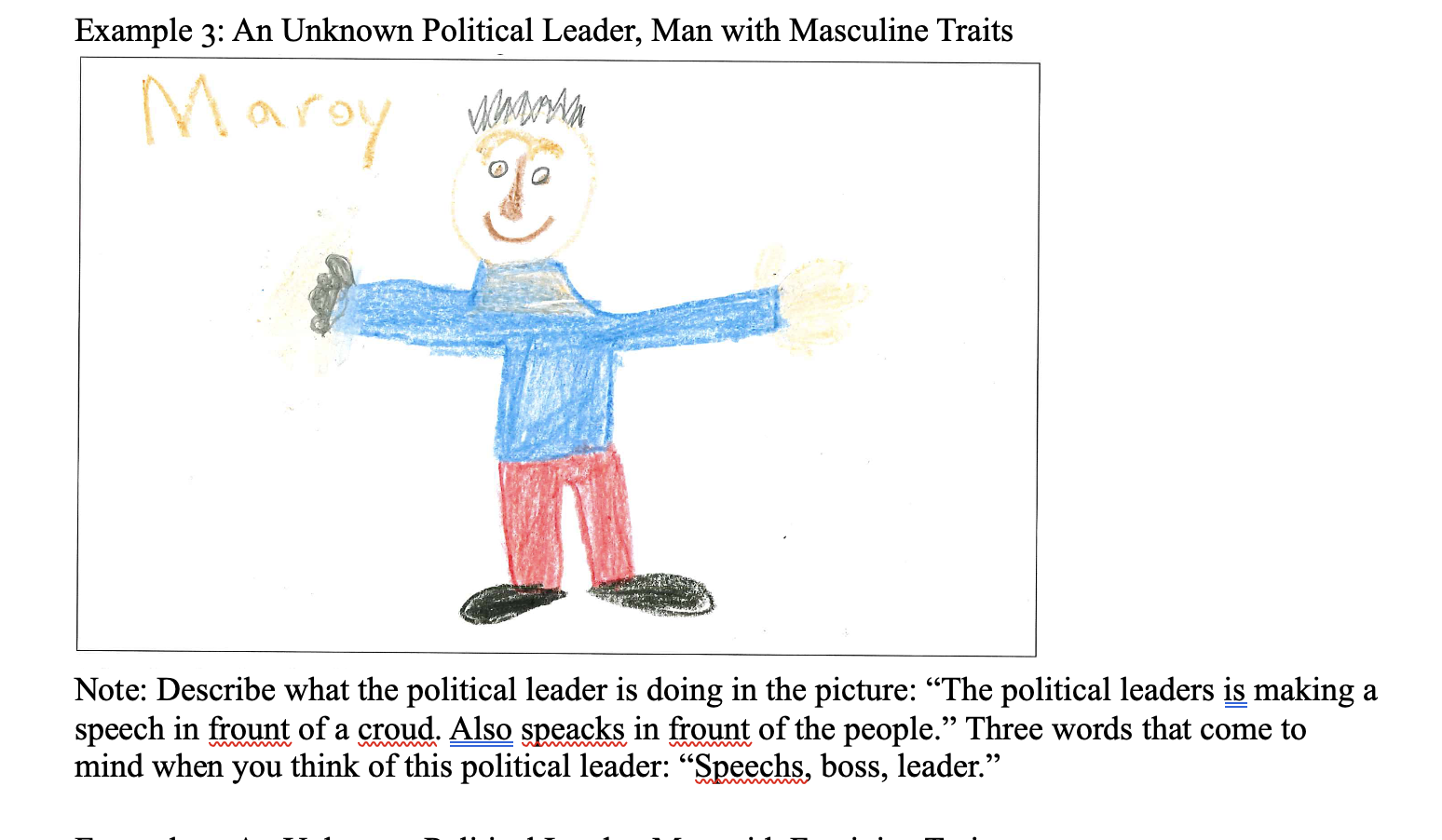
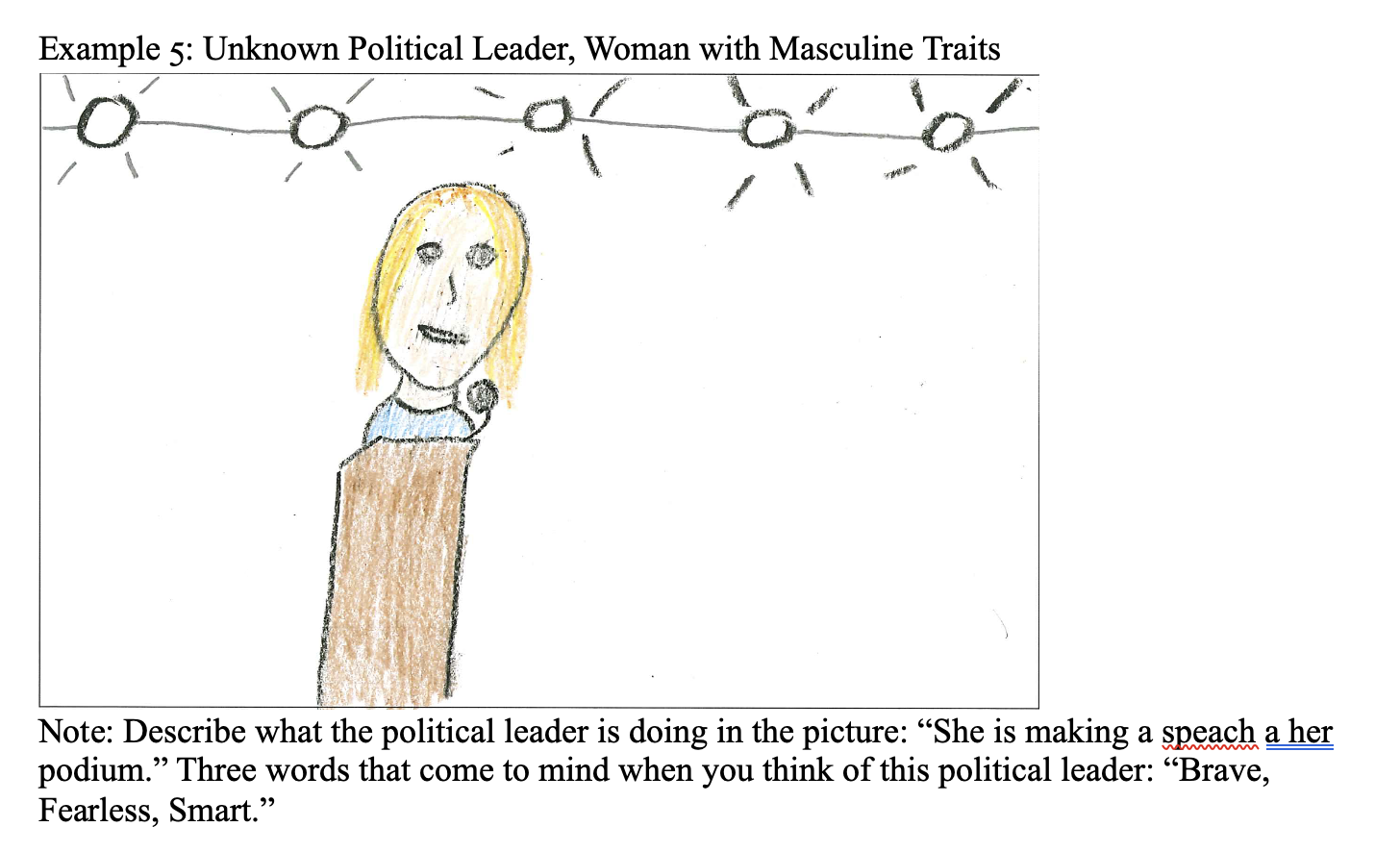
H1: Gendered occupational preferences
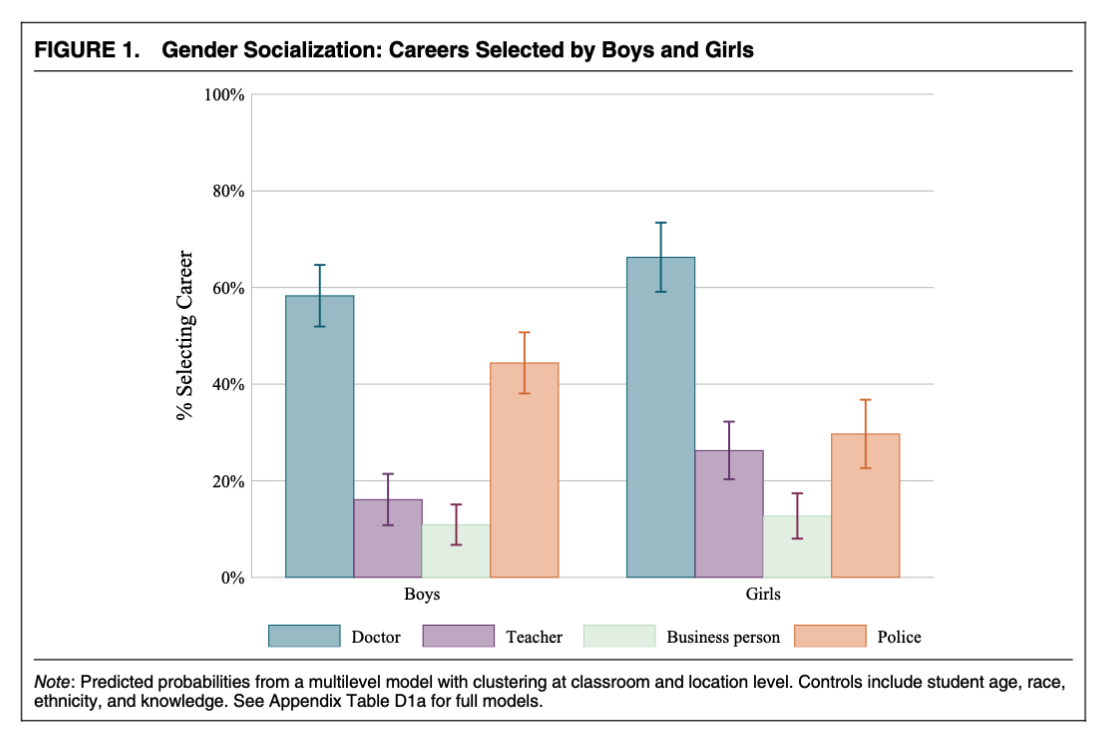
H2: Gendered occupational preferences strengthen with age
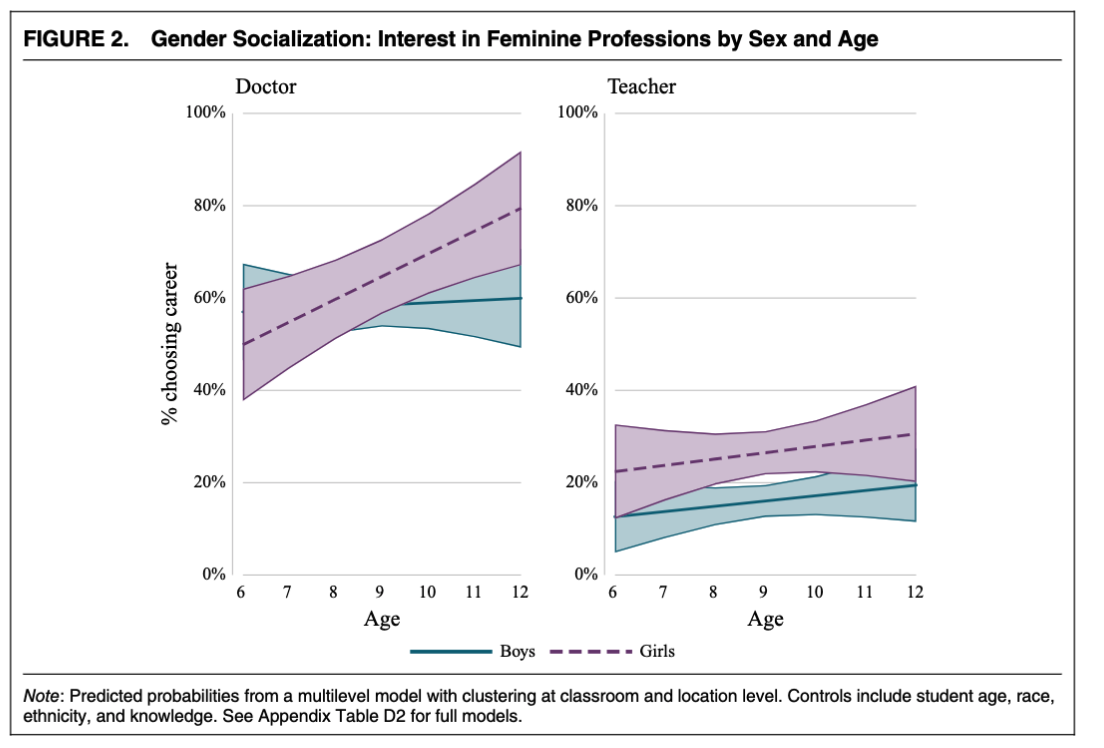
H3: Greater political interest and content with age
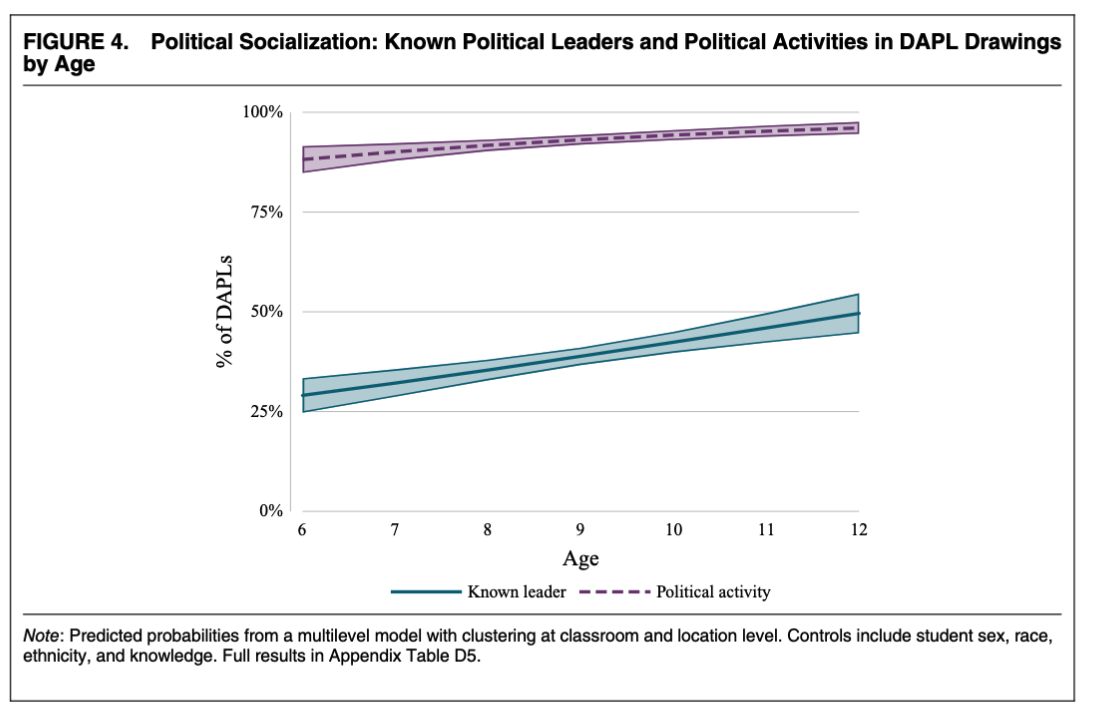
H4: Childrens’ images of political leaders more likely to be male
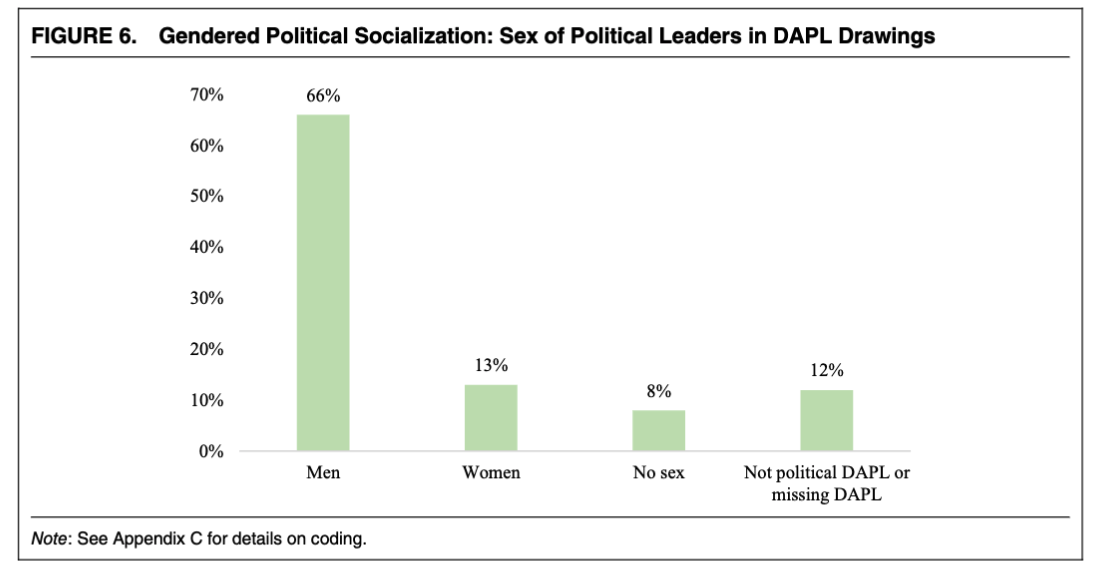
H4: Childrens’ images of political leaders more likely to be male
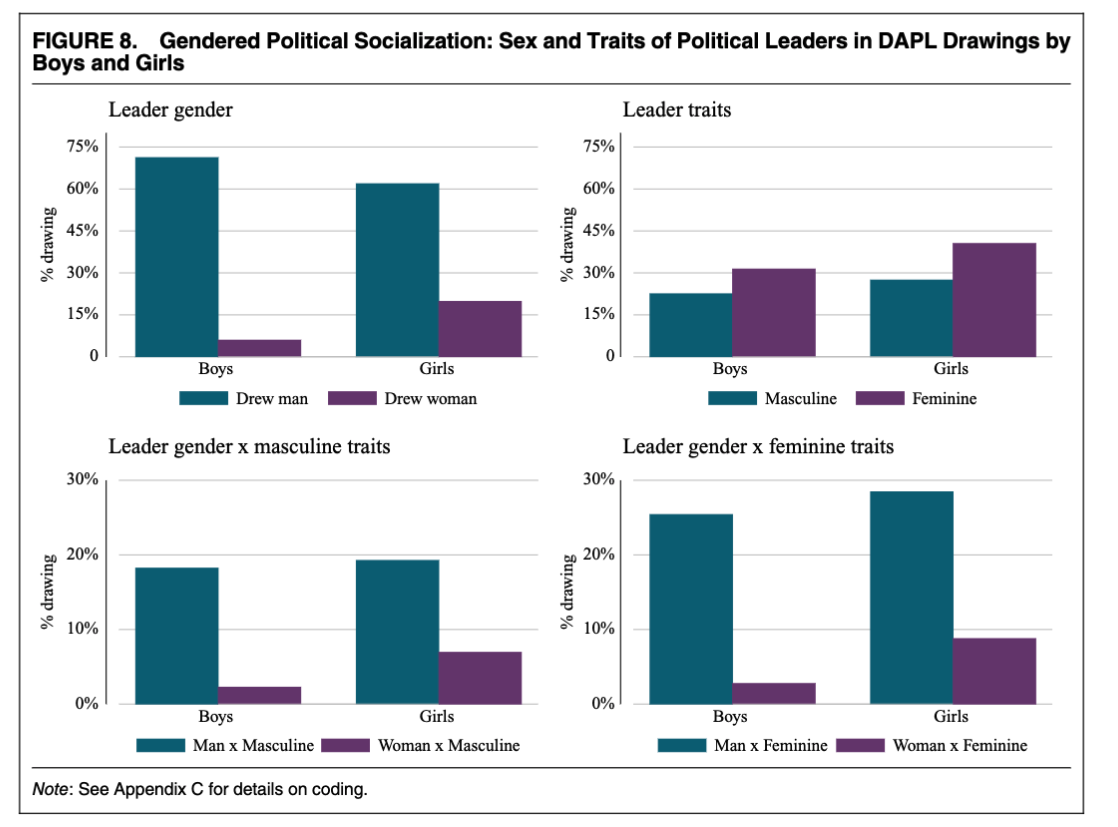
H5: Images of female political leaders less likely with age

H6: Girls report lower levels of political interest and ambition than boys
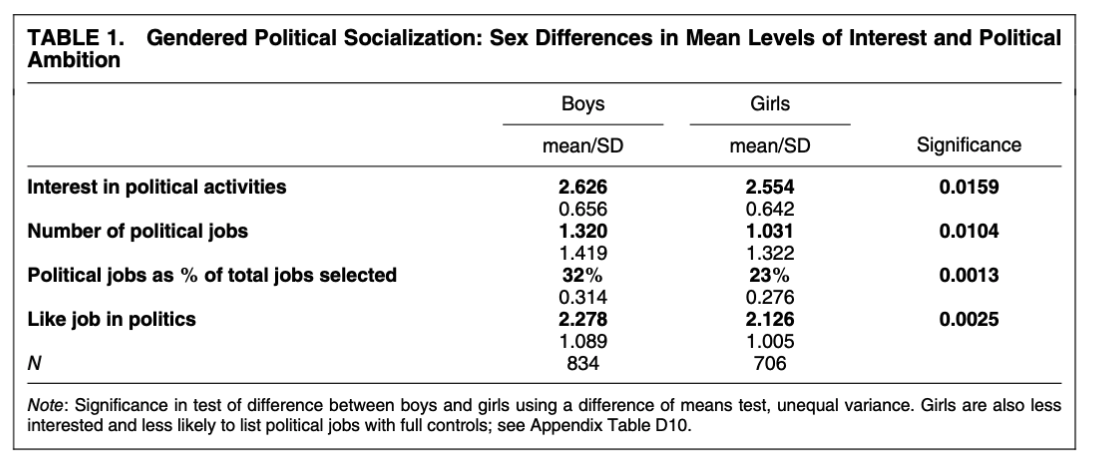
H6: Girls report lower levels of political interest and ambition than boys
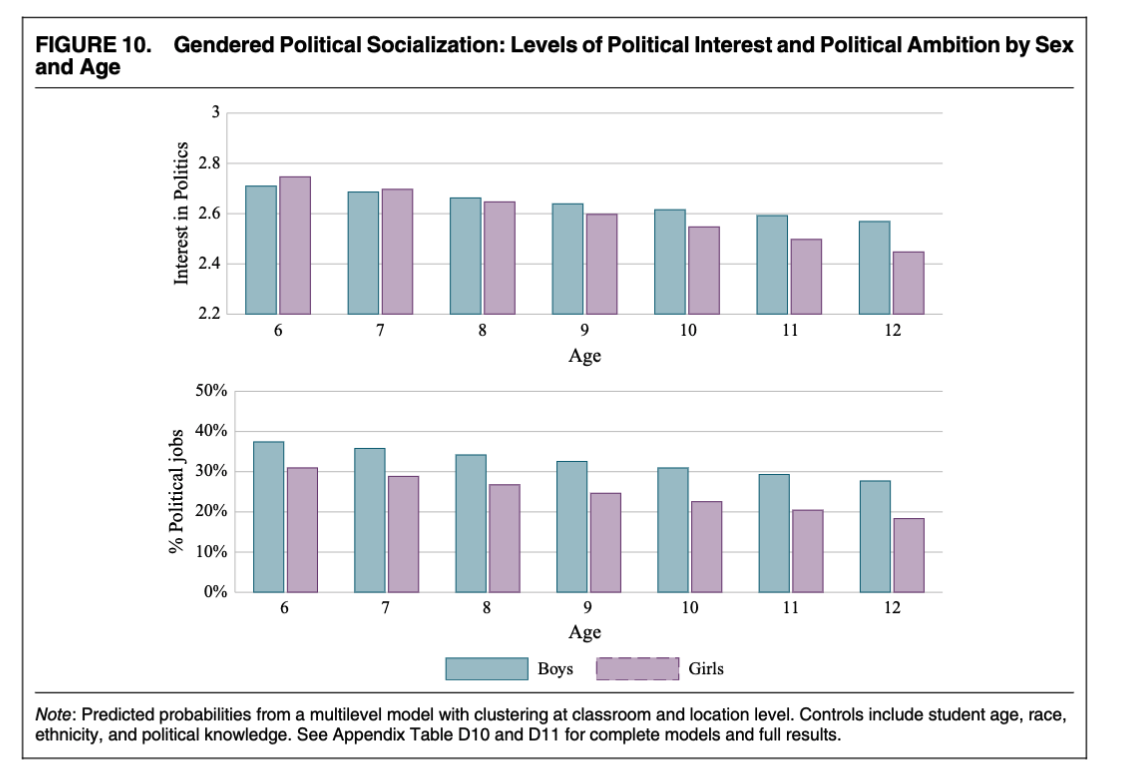
Sumamry
As girls learn more about politicsand internalize society’s expectations of them, they are less likely to see traditional politics as a place for them to lead. And while our data only suggest, but do not offer direct evidence of, continuity between atti- tudes in childhood and attitudes in adulthood, they do indicate that efforts to elevate the political interest and ambition of women must begin early.
Summary
Gender has political consequences as evidenced by “gender gaps”
The cause(s) of those gaps are complicated and varied
Need good measurement and better theory
Gender, Sexism, and Representation
Most States are Majority Female

Most Elected Officials are (White) Males
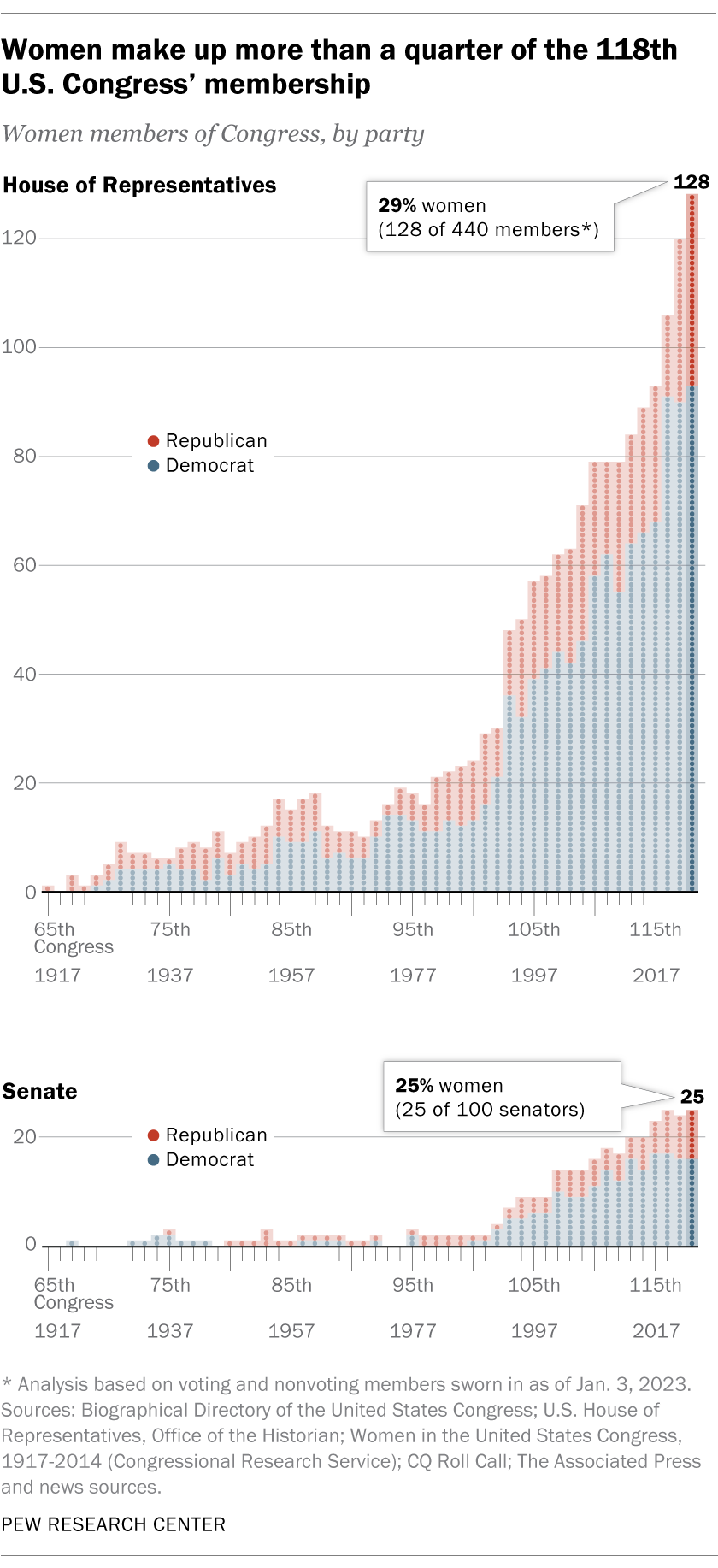
Why?
Big questions rarely have simple answers:
Historical, social, economic, inequality
Stereotypes and Discrimination
Socialization and selection
What else?
Issue Ownership
Petrocik (1996) parties “own” certain issues
Democrats are better at handling social issues like health care
Republicans are better at economic and foreign policy
Campaigns prime voters to think about the issues that benefit their candidate
Gender Issue Ownership
Scholars make similar claims with regard to gender. Voters tend to think:
Women are better able to handle “feminine” social issues
Men are better at “masculine” issues related to the economy and defense
Are these associations due to gender stereotypes or associations between gender and partisanship?
Gender or Partisan Stereotypes
Huddy and Terkildsen (1993) conduct an experiment, randomly assigning male and female candidates to have either masculine or feminine traits
Huddy and Terkildsen (1993)
[Elizabeth/Robert] McGuire, a lawyer, has been described by legal colleagues as [an intelligent, compassionate, trustworthy, and family-oriented/a tough, articulate, and ambitious] opponent with proven leadership skills and strong [people/administrative] skills. Ms. McGuire, forty-two, is a life-long resident of Connecticut, a long- time political activist, and currently is seeking office at the local level.
Both Candidate Gender and Traits Matter
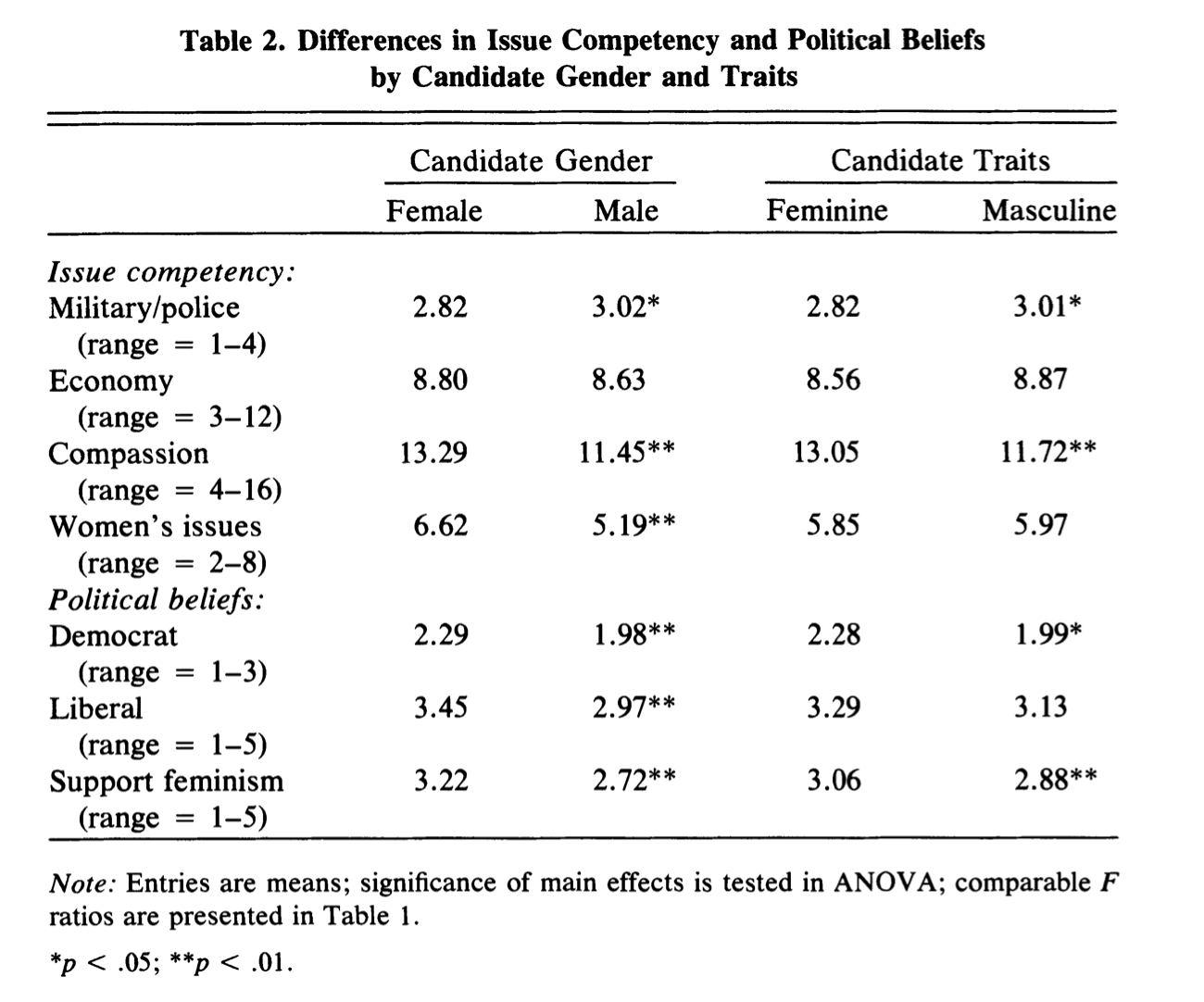
Both Candidate Gender and Traits Matter
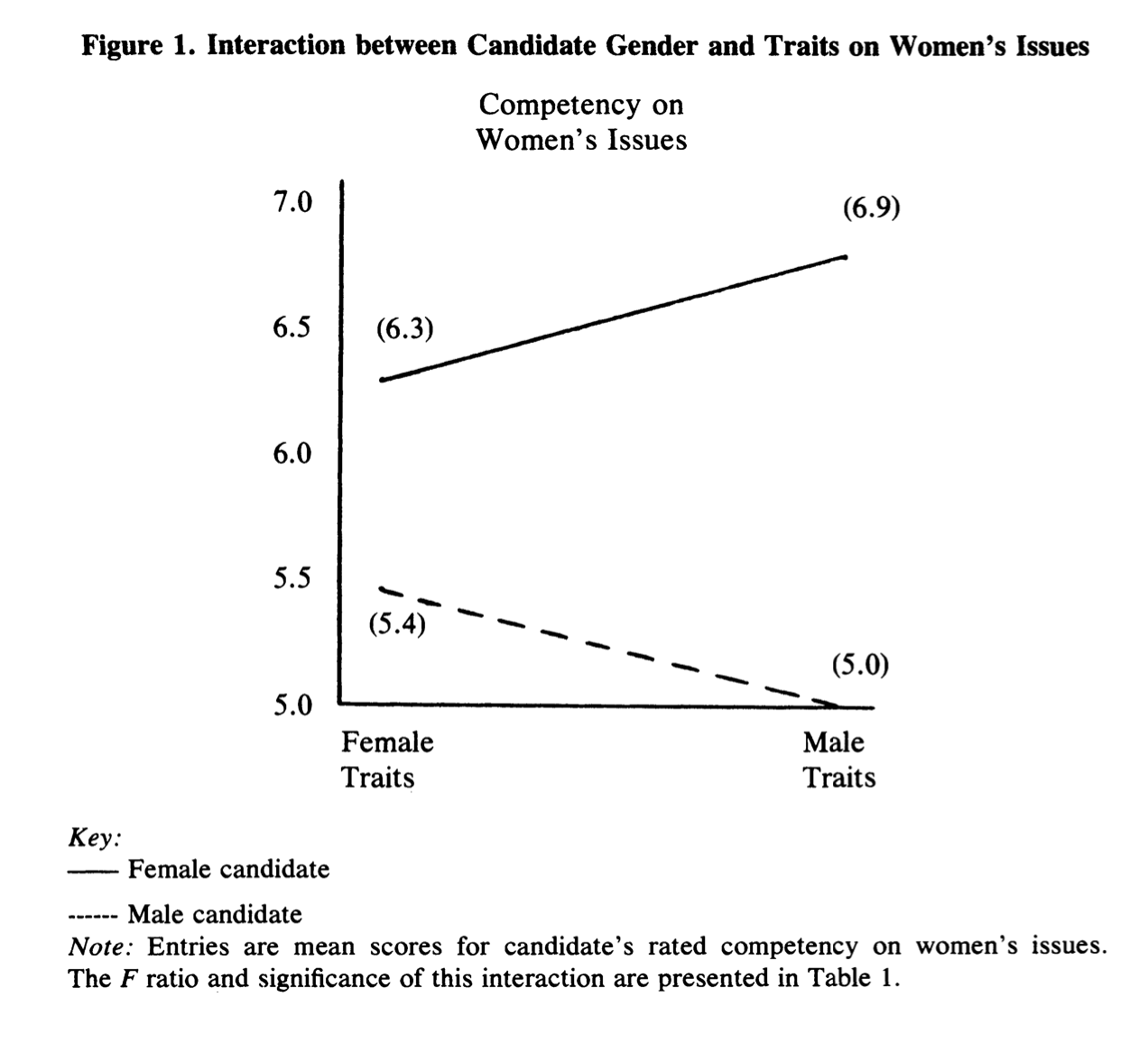
Inferred gender beliefs matter more than inferred political beliefs
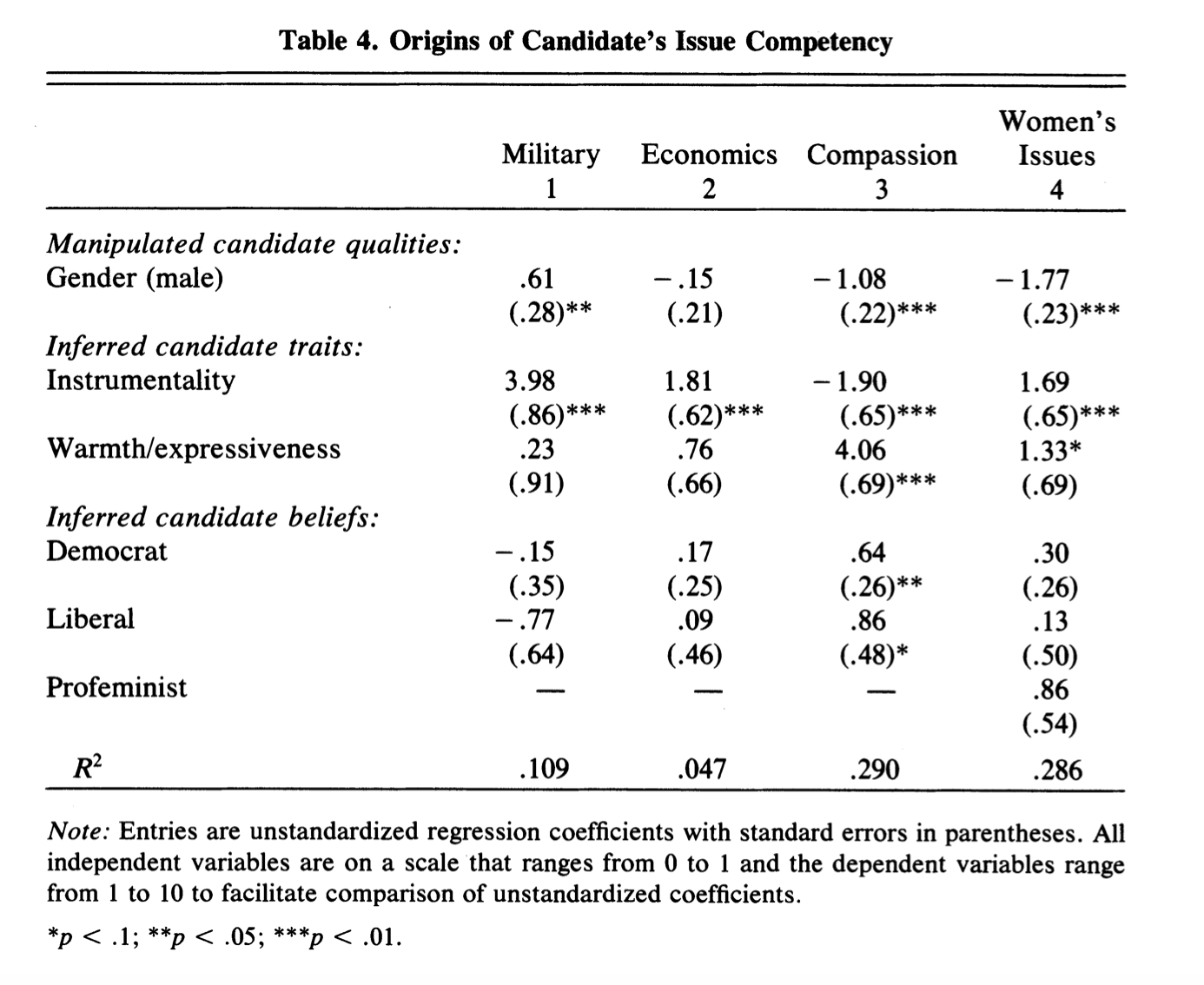
Summary
Gender shapes voter evaluations of candidates
The effect of such stereotypes isn’t always clear:
Gender stereotypes have to be activated (Bauer 2014)
Women can benefit from running “as women” (Herrnson et al. 2003)
Women may also benefit from running counter to stereotypes Bauer 2017
Attitudes about gender
Measuring sexism
As with race, many measures distinguishing:
Type:
Overt vs Covert
Old-fashioned vs Modern
Dimensionality:
- Single vs Multiple
Measuring sexism
Old-fashioned sexism (Swim et al. 1995)
Women are generally not as smart as men
I would be equally comfortable having a woman as a boss as a man
Measuring sexism
Old-fashioned/Overt sexism (Spence, Helmreich and Stapp 1973)
Modern sexism scale (Swim et al. 1995)
Denial: Discrimination against women is no longer a problem in the United States
Antagonism: It is easy to understand the anger of women’s groups in America
Resentment: Over the past few years, the government and news media have been showing more concern about the treatment of women than is warranted by women’s actual experiences.
Measuring sexism
Old-fashioned/Overt sexism (Spence, Helmreich and Stapp 1973)
Modern Sexism scale (Swim et al. 1995)
Ambivalent Seismic (Glick and Fiske (1997))
Benevolent: “A good woman should be set on a pedestal.”
Benevolent: “Women have a quality of purity few men possess.”
Hostile: “Most women interpret innocent remarks or acts as being sexist.”
Hostile: “Women seek to gain power by getting control over men.”
Which measure should we use?
I’m not sure there’s a good answer
Two applications
Modern Sexism Shaped the 2016 Election
Hostile Sexism and the 2020 Elections
Modern Sexism in 2016 Democratic Primaries
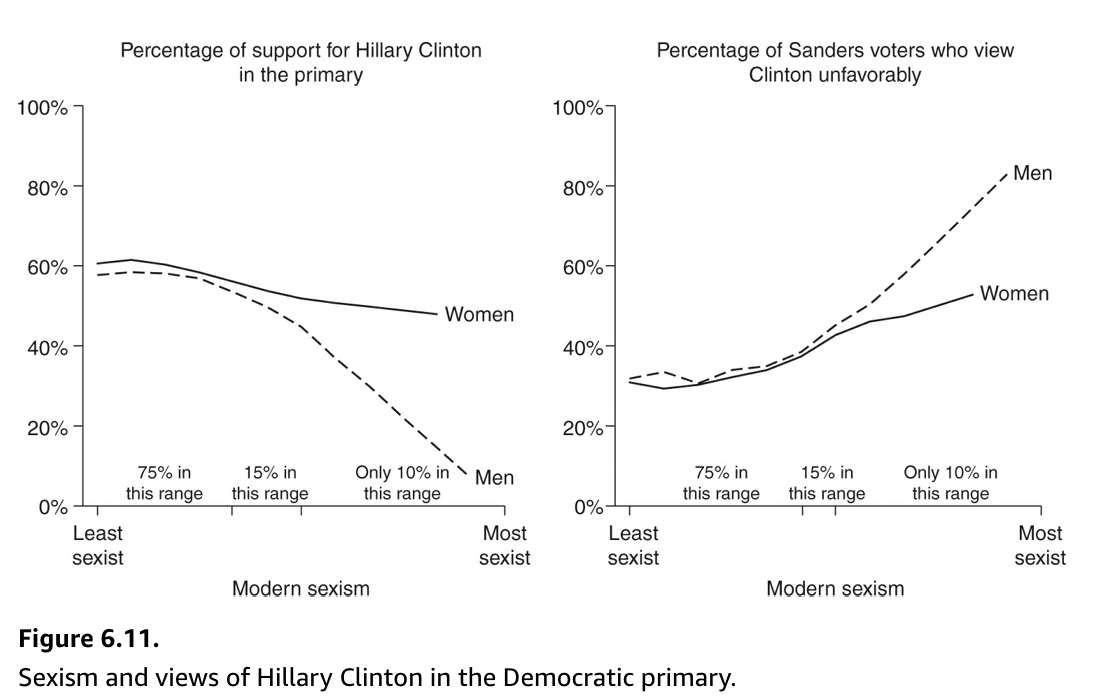
Source: Sides, Vavreck and Tesler (2019)
Modern Sexism in 2016 General Election
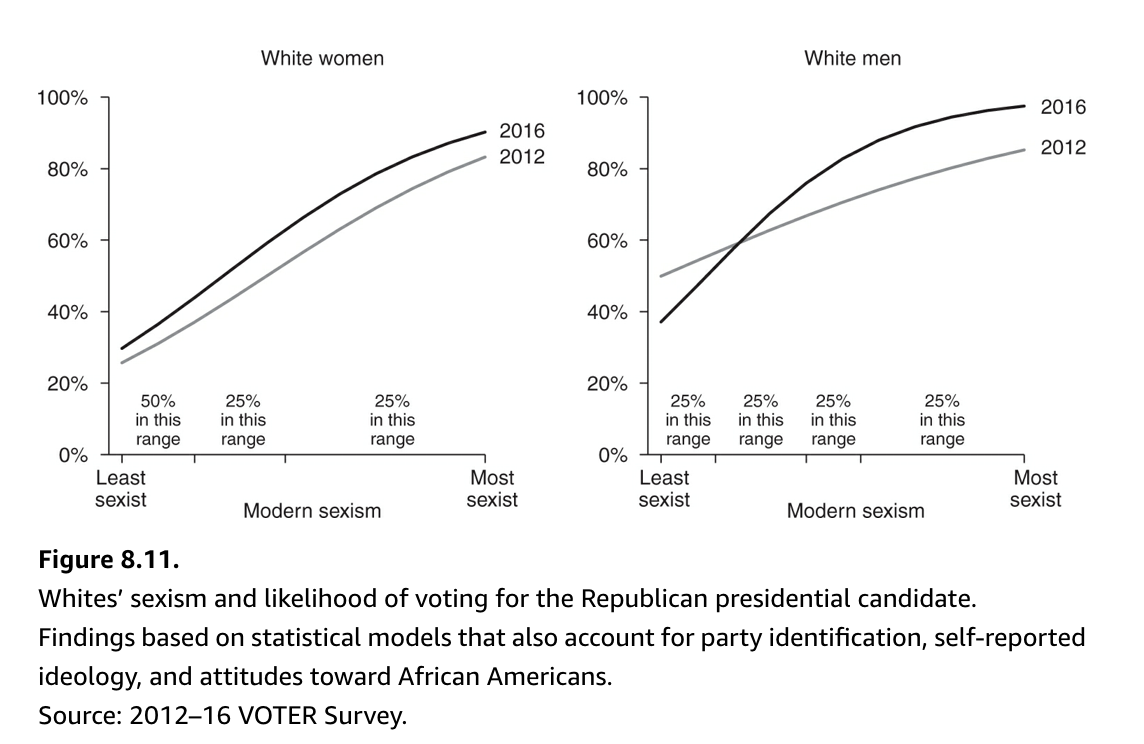
Source: Sides, Vavreck and Tesler (2019)
Hostile Sexism and 2020 Elections
Hostile Sexism Predicts Vote Choice in Democratic Primaries

:scale 50%
Source: Data for Progress
Hostile Sexism Predicts Vote Choice in Democratic Primaries

:scale 50%
Source: Data for Progress
Sexism may hurt Republicans in the General Election

:scale 50%
Source: Data for Progress
Group Discussion
Sexism appears to predict vote choice and political attitudes
How could we unpack the mechanism(s) behind this relationship
What might be done?
If we could change people’s scores on modern/hostile sexism, would we change politics?
Egan (2012)
Review
Take a few minutes to review your notes on Egan (2012)
- What is the research question?
- What is the theoretical framework
- What is the expectation and design
- What are the results?
Research Question
What explains the political cohesion of lesbian, gay, and bisexual citizens?
Is it a function of identity mobilization
Or a reflection of selection effects (common attributes that predict shared identity)
Theoretical framework
- Distinguishes between sexual preferences and sexual identity
While the preponderance of the evidence is that the degree to which one is sexually attracted to those of the same sex is a trait that is fixed at birth or in early childhood, being gay is a chosen identity – an identity acquired among a non-random subset of those endowed with the trait of same-sex attraction.
Past work on identities suggest chosen identities → + cohesion
Mobilization
Acculturation
Egan proposes an alternative mechanism: selection
Selection and group cohesion
“[T]he process by which stable characteristics that are truly ‘unmoved movers’ – the indelible aspects of one’s background and upbringing – help to determine whether a person self-selects into membership of a politically relevant group” (p. 598)
Why Selection Matters: Substantively
“To the extent that group members are loyal partisans for reasons that antecede the acquisition of group identity – and therefore are less easily moved by appeals to group interests – it becomes more difficult for group leaders to make a credible threat to withhold support from their allies in order to win policy concession” (p. 598)
Why Selection Matters Empirically
Failing to control for “pre-treatment” variables (things that predict identity acquisition) biases our esimtates of the effects of that identity
Controlling for factors “post-treatment” likewise obscures the effect of identity, since these factors may be influenced by identity acquisition
Expectations:
“If selection is at work in making a group’s members politically distinctive, the ceteris paribus differences in political views between group members and the general population should be reduced after conditioning on the effects of background characteristics that shape identity choice and are also known to be determinants of political views.”
- Accounting for selection should reduce differences
Expectations:
In addition, if selection effects are present, it should be the case that group members are distinct from non-group members from the moment they identify with the group and thus the development of political cohesion should not require the mobilization processes that can accompany the passage of time, contact with group members or receipt of co-ordinating messages from group leaders
- Differences should exist in the absence of mobilization acculturation
Design
Data: GSS and exit poll surveys
Method: Matching
Matching
Matching is a statistical procedure to adjust for differences between groups in observational data
When we match we’re trying to recreate what is accomplished by random assignment in an experiment
While random assignment guarantees this for all variables (observed and unobserved), matching provides balance only on observed covariates.
Little Variation in Support based on Candidates LGB Voting Records

Sexuality vs LGB Identification

Initial evidence of selection

Further evidence of selection

Matching creates balance on observed covariates

Quantifying selection effects

Selection explains group cohesion of LGB on policy and ideology

Differences exist before mobilization and acculturation

Summary
Egan argues selection accounts for group cohesion among LGB individuals
Matching as a tool for making causal claims with observational data
- Useful tool but not a magic wand
Possible critiques and/or extensions?
References
References

POLS 1140

